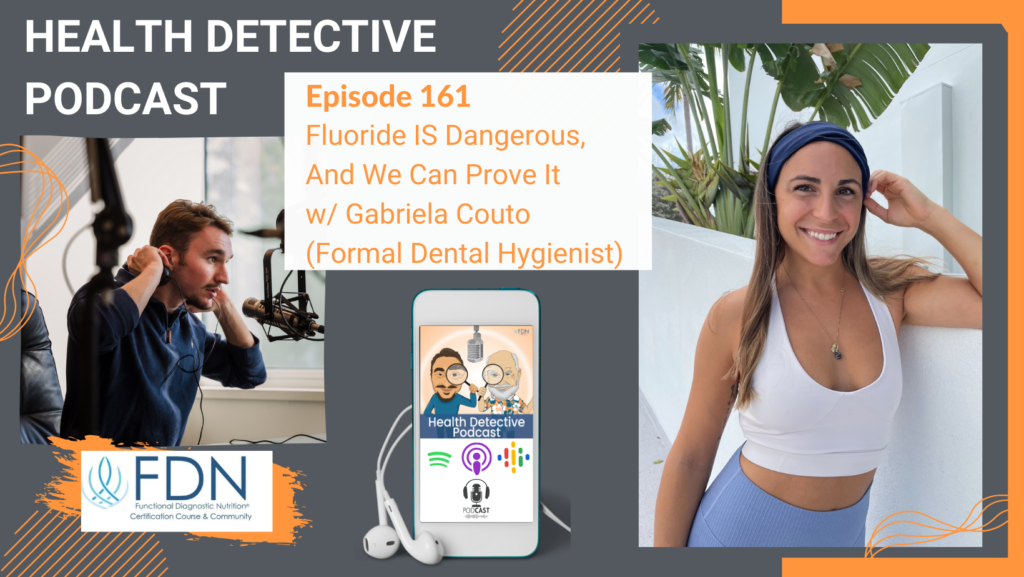Introduction
[00:00:00] Detective Ev: Hello, my friends. Welcome back to another episode of the Health Detective Podcast by Functional Diagnostic Nutrition. My name is Evan Transue, AKA Detective Ev. I will be your host for today’s show where we talk about how fluoride is dangerous.
We’re talking to my friend Gabriel Couto today, and I don’t just bring friends on because they’re friends. If you’re a regular listener, you know that I have done this occasionally throughout our 160 episodes. I never just prioritize someone because they’re a friend. I do that when they are a friend and also have useful health information to share.
Gabriela was someone who was in the dental hygiene space for a while. She was working as a dental hygienist, and she was trying to take it a step further. She was getting her master’s degree. While she was pursuing that master’s degree, she was doing research on fluoride. She even says in the episode, I appreciate her honesty there, she kind of had like a slight idea that fluoride might be bad, but she wasn’t walking into the research with some strong bias. She just wanted answers. She wanted to know one way or another, is this good or is this bad?

It turns out that the best lies are half true. Fluoride, as it seems, is certainly, at a certain small dose, beneficial to oral health. But the best lies, like I said, are half true. What that doesn’t tell you is that we are overdosing people with this stuff. Ironically, when we overdose them, fluoride is actually bad for the teeth. It also doesn’t tell us that when we consume this orally, such as like in water, there is no evidence showing strongly that this does really anything for our teeth whatsoever.
Rejected Research, Finding out if Fluoride is Dangerous
Very minor improvements at best, but overall, no evidence showing that it’s worth the bad effects that’s for sure.
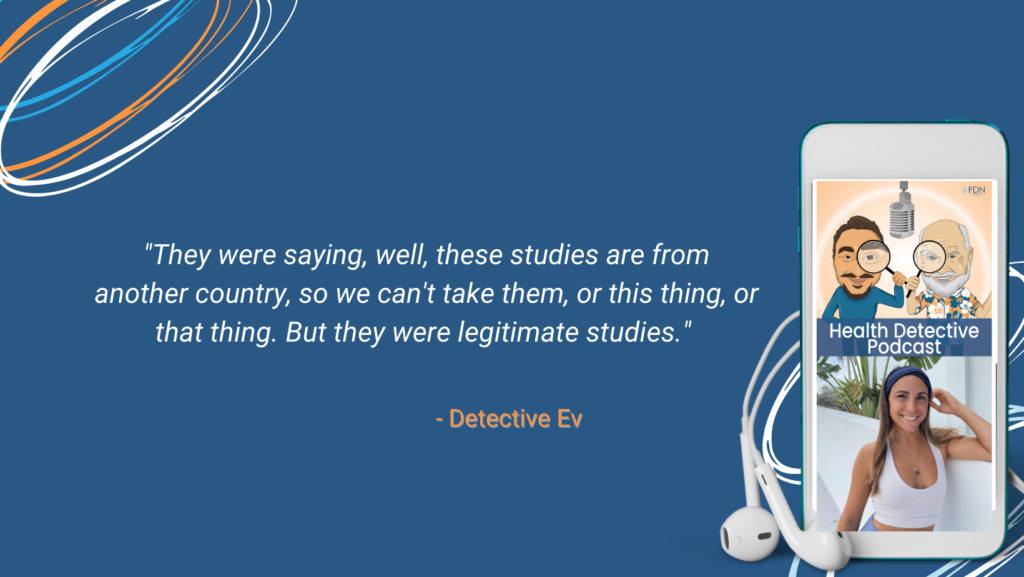
Gabriela, while doing this research, was starting to understand some of these things. All she did was present this in her college class and she found that she got shot down. They were saying, well, these studies are from another country, so we can’t take them, or this thing, or that thing. But they were legitimate studies.
They just weren’t the studies that they were talking about. There was nothing inherently wrong with them at all. Other than these arbitrarily selected things that made them wrong, such as, again, being done in another country. I didn’t know that studies can somehow become bad just because they’re from another country.
Not ignorant to the idea that if we’re comparing ourselves to a third world country that perhaps data could be skewed or would be more likely that there would be corruption in those studies. But when we’re talking about things from decent countries in the European Union, I don’t know why that would be an issue.
If you look at America’s history of the studies that we’ve put out, I don’t think we’re any better than any of these other places. In fact, sometimes I think money mixed with corruption leads to a whole lot worse when it comes to studies like this, but I digress. I’ll get off my soapbox there.
The point is Gabriel was not being a skeptic. She wasn’t being some conspiracy theorist. She had some questions about this. She found interesting data. And when she presented it in a reasonable manner, was shot down by her teachers. This actually was one of the main reasons she ended up not pursuing the end of the master’s degree.
Sharing Facts that Fluoride is Dangerous
She was just done with this and wanted to go do something else. So, she started out with actually educating people on Instagram about the dangers of fluoride and other things that they can do for their oral health naturally. This person’s got great teeth. She knows what she’s doing. She’s not an idiot.
This isn’t someone that’s just talking about some hippie things and then, well, maybe it’ll work, maybe it won’t. She has the results to back this up. Now she does coaching. She actually does NLP coaching mixed with some other mindset work. NLP is neurolinguistic programming for those that don’t know.

But the point is, she posted something recently that reminded me that she was in that space before. We haven’t talked about this in a while, and I forgot about it. But she went off on her Instagram story, throwing down about all these facts, all this research with fluoride. I immediately messaged her, and I said, whoa, we got to get you on.
We haven’t had someone to really talk about this, not in depth. Maybe someone’s listed it off as something you shouldn’t be consuming. That’s great. We’ve all heard that, but why? Why shouldn’t I be consuming it? Where can I maybe start in the right direction of getting good research to present to other people in my life so that they don’t just think I’m some crazy person that watched a YouTube video and now think they’re poisoning the water with fluoride?
Science-backed Knowledge that Fluoride is Dangerous
It’s going to be a good one. I think you guys are going to like this.
Gabriela is not someone that even does podcasts normally. So, I greatly appreciate her coming on and, probably, I’m assuming, going out of her comfort zone to do this with us. But she was very dedicated to sharing this information.
She has nothing to sell you. I allowed her to shout out her coaching afterwards in case anyone’s interested in it from a business coach perspective, but that’s not why she came on. She literally came on to share this information with people. I can’t tell you how much I appreciate that. I know I speak for everyone, Gabriela, when I say the audience appreciates it.
Without further ado, let’s get into a fact-based episode about fluoride.
All right. Hey there, Gabriela. Thanks so much for being here with us today.
[00:04:44] Gabriela Couto: Hi, thank you so much for having me. I’m honored. I’m excited.
[00:04:47] Detective Ev: I’m very excited for this topic. I think you’ll end up being like episode 161. Believe it or not in all these episodes, we have never had someone come on and talk about our main focus today, which is fluoride.
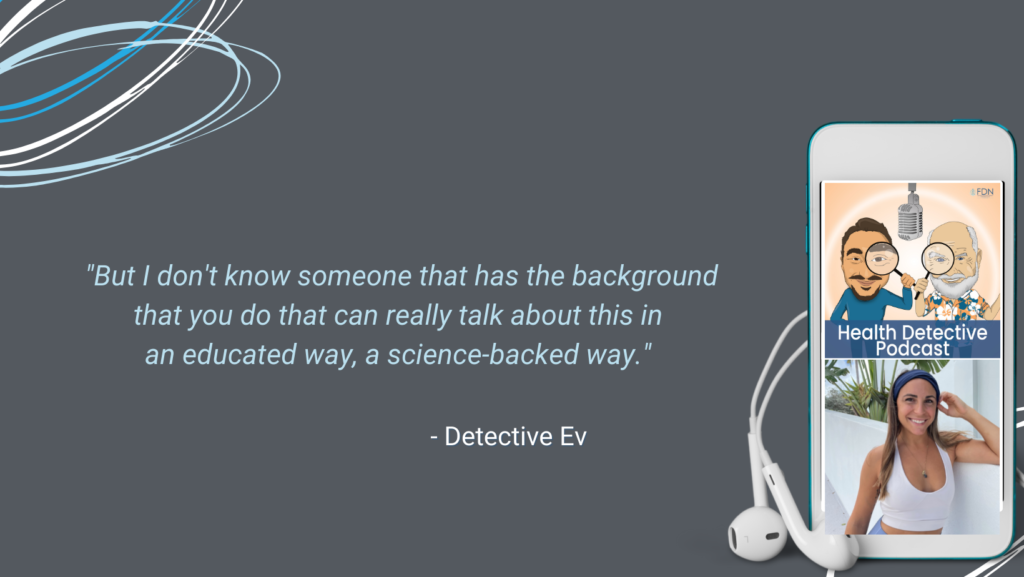
Certainly, even if it’s been mentioned, I’m sure someone’s rattled off, we want to avoid things like Glyphosate, fluoride, whatever. They might have mentioned it in that way. But I don’t know someone that has the background that you do that can really talk about this in an educated way, a science-backed way. Because I think there’s a whole part of the population that thinks this is like, woo, woo. Oh, that’s hippy stuff. You know, the fluoride is not a big deal.
Depression and Anxiety Effects Led to Yoga Practice
When you actually look at the literature, that could not be further from the truth. It’s certainly being used inappropriately.
Then I saw your Instagram story. So, I was totally excited. I never bring on a friend just because they’re a friend. I bring on someone that has something useful to say. Just like we’ve had Sky on, we brought on my friend Anna, she’s local. These are people that are in the space in some way or another or have been in the space and have a lot to offer us.
What I want to do is jump into this kind of similarly to how we do with most people. Because from my understanding, unless there’s something you haven’t told me, it’s not like you dealt with cancer or some severe autoimmune disease like many of our guests.
Have you had any like major health symptoms in your life that made you more open to the holistic side? It’s okay, if not. I’m just curious if that’s been a thing for you.
[00:05:59] Gabriela Couto: I’m so open to sharing. My journey is, I actually experienced a lot of anxiety and depression growing up from school. That actually kind of affected my body and I wasn’t able to play sports anymore. That’s actually how I got into yoga.

I needed some kind of outlet of movement, and I couldn’t do anything very strenuous. So, that’s when I got into yoga and then that tapped into my mind. I didn’t realize how yoga is so closely connected with the mind, so the whole mind-body connection. It’s been just a beautiful journey from there.
Meditation and the Power of Your Mind
[00:06:27] Detective Ev: It’s embarrassing to admit, but it took me almost a year. I think I messaged you at one point to figure out your username like yogabriela was like the yoga thing. I like to believe I’m smart and then I do things like that. I’m like, okay.
[00:06:39] Gabriela Couto: It’s ok. It’s just a combination that I thought was kind of clever.
[00:06:42] Detective Ev: It is. That makes me feel better. Thank you.
So, you got into the yoga. Did you grow up with any influence that was more holistically minded? Because even yoga, that’s still something that for a lot of people, especially the teachings, if you’re actually doing this, that’s not necessarily conventional. I mean, it could seem a little much for people. Did you have any type of family influence that led you to be more open minded to this? Or was that just something you did naturally? Like, hey, I’m naturally open to this stuff.
[00:07:06] Gabriela Couto: I was actually kind of gravitated to it with school, I heard of yoga. But in my area, there was nothing with yoga.
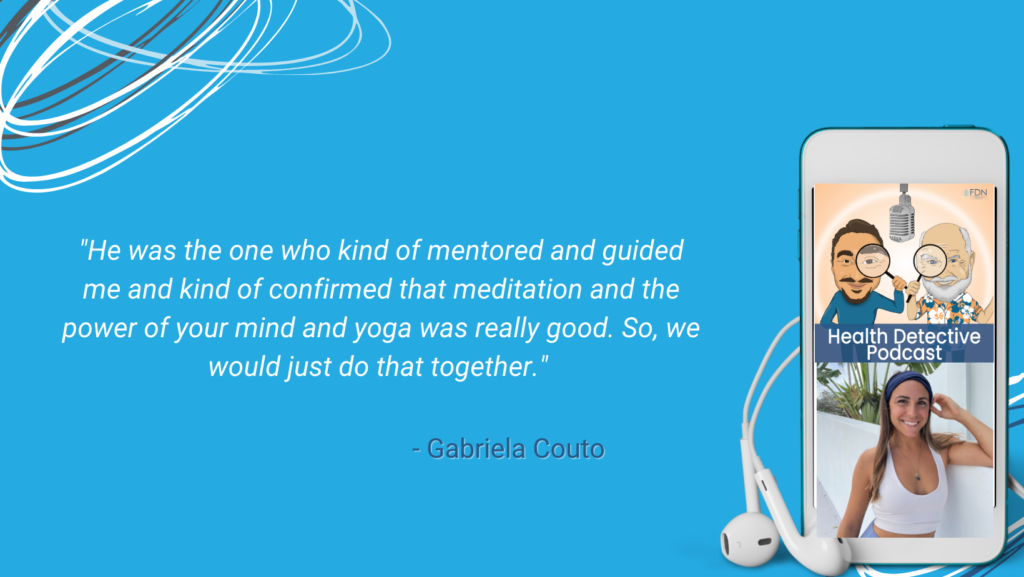
Actually, I kind of got frowned upon when I mentioned it to family or friends. They were like, oh, it was bad for you. And if we talk about spiritually, like it’s evil and stuff like that. But funny, in fact, how this kind of correlates. One of my best friends was diagnosed with osteosarcoma. He was the one who kind of mentored and guided me and kind of confirmed that meditation and the power of your mind and yoga was really good. So, we would just do that together. That ties into later on, when we talk about fluoride, how osteosarcoma is a part of that.
Always Wanted to Help People
[00:07:38] Detective Ev: So, then this was obviously a little younger.
I know at one point, I’ll kind of just jump to it, to get into the fluoride stuff. You were in college, and at this point, you were already (I don’t know how the degrees work with that), were you already a dental hygienist when you were starting to get into the master’s level?
[00:07:53] Gabriela Couto: Yes. They actually had a program where it was like, if you apply for your master’s degree within a year of graduation, then you’ll get it for free. So, I kind of wanted to take advantage of that, cause it’s MCPHS. That was the school I was going to. It’s kind of like an Ivy League School and it’s very well known. So, it was like, oh, great degree. And if I could get it for free, why not?
I actually wanted to get into research, but then I was researching research and it just didn’t really call for me.
[00:08:18] Detective Ev: Was the dental hygiene thing, was that a passion or was that just something that, hey, I think this is going to pay the bills? I only ask cause I’ve met someone that had it as a passion. She was in my Toastmaster’s club, but I haven’t heard a lot of people say that. So, I’m curious.

[00:08:29] Gabriela Couto: It’s actually kind of funny cause I’ve always wanted to be a hygienist since I was a little girl. I’ve always wanted to help people, but I’m an INFJ so the introvert aspect, I just wanted to be left alone and help people in some kind of medical field.
Wanting to Decide for Myself
Growing up where I grew up and just very limited with my options, and I didn’t have an open mind or perspectives or other people to mentor and say you could be a business or get into yoga or any of these other options. It was just very medical, lawyer, stuff like that.
So, I was like, okay, this is a good way. And I’ve always loved teeth. So, it’s all coming together in some form or some way.
[00:09:03] Detective Ev: Well, if it wasn’t obvious to the audience that we were friends before, it is now because you brought up Myers-Briggs unprovoked. As anyone knows, I’m a total personality, love that stuff.
We had a whole episode where we actually have a FDN who has training in the Enneagram as well. She ended up, we’re talking about health and then we do like a 30-minute typology lesson. That was cool. But separate conversation, of course.
So, you’re getting into the research and you’re studying fluoride. Then what started happening? Just to be clear, cause research is research, so you can go in with a bias and that’s fine. But when you chose fluoride, did you go in with the idea that fluoride is already bad? Again, if that’s the case, that’s fine. Or were you trying to decipher, I hear this is good, I hear it’s bad. I just want to know for myself.
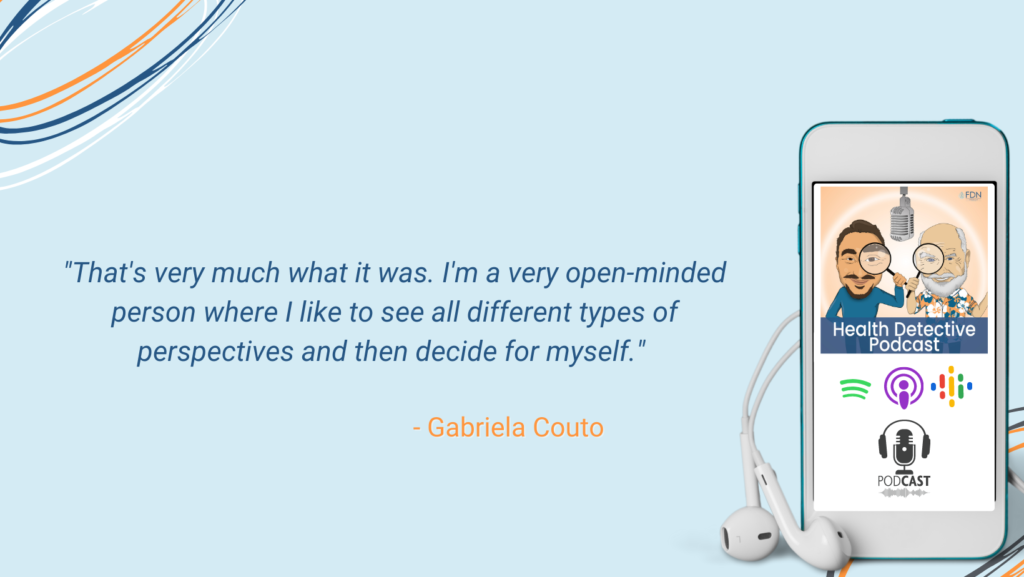
[00:09:44] Gabriela Couto: That’s very much what it was. I’m a very open-minded person where I like to see all different types of perspectives and then decide for myself.
Doing the Research, Making My Point, and Sharing it With Others
In school, our teachers were like, you know, when you get out to the real world, you’re going to hear controversial things about fluoride, whatever you do. Like this is proof. We all know the research and they’re wrong. I actually had one girl in the class, and she was like, questioning it. I was like, hmm, maybe out of all 16 classmates, that were in it, I was the only one that had three clients that asked about fluoride and was like, oh, fluoride’s bad for you. The teachers were like, oh no, it’s just a mild dose.
That’s how I got into it. When I had the opportunity to do a research, I was like, fluoride. It’s a controversial kind of thing. I’m interested, I’m intrigued, and I want to see it for myself. That’s actually why I kind of quit my master’s degree program because it was literally pulling teeth and they wouldn’t validate the sources that I had.

American Cancer Association was also one of the studies that I used for it, and they still denied it. I was just like, it’s not worth it to me. The research that I had done, I was like, I made my point and that’s okay. That’s my opinion. But now it’s just about sharing that with other people who are open to hearing it.
[00:10:48] Detective Ev: I don’t know if you realized that you used “pulling teeth” because even if that wasn’t a pun, that was pretty funny. So, good joke.
Why Do Only 30 Countries Allow Fluoridated Water?
Anyway, that’s important though, for people listening. I know that our group’s more on the side of, they wouldn’t even care if you said yeah, I believed fluoride was bad. Then I went and proved it. They would still probably support that.
But I do think it’s notable to say, cause I believe you, you’re going in with an objective mindset. Like I just hear controversy about this, I want to decide. It’s not that you knew one way or the other, you just want to get some answers and that’s fair.
What was the first piece of evidence, if you remember? Maybe like the first notable thing in your head that came across your laptop or whatever it might have been where you were like, wait a second, this is not looking so good.
[00:11:27] Gabriela Couto: I can’t really remember too much of the first study. I think the biggest thing was all of the studies that showed fluoride was bad, was more so countries outside of the U.S.
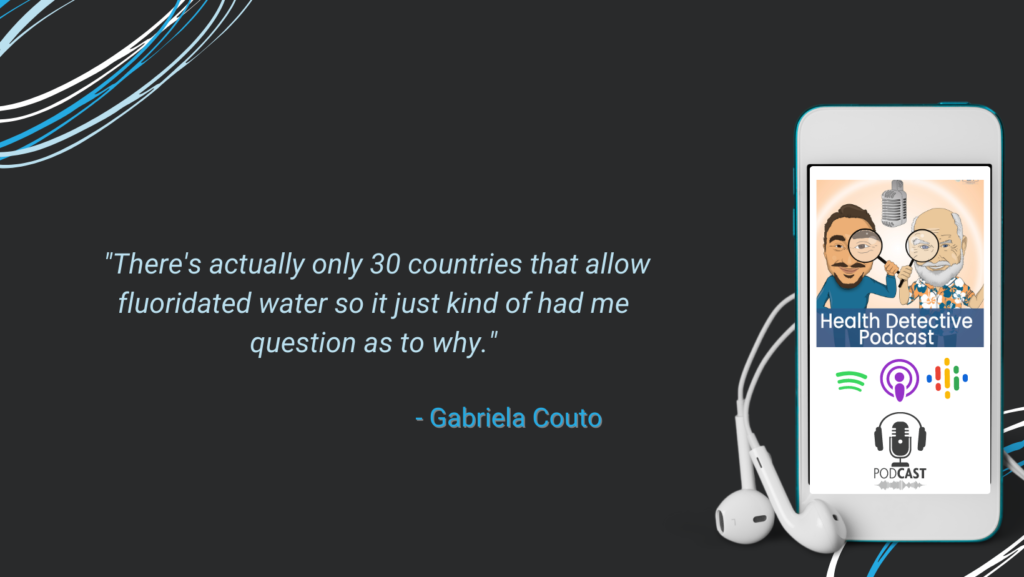
I was questioning why was it just outside of the U.S. that was providing that information and realizing that Europe actually has banned fluoride. There’s actually only 30 countries that allow fluoridated water so it just kind of had me question as to why. Again, for me is you can’t really control the dose when you’re drinking fluoridated water.
Knowing what I know with like local anesthesia, our sublingual glands are one of the fastest absorption rates versus an IV. So, it’s second to that. To get into the blood stream underneath your tongue is one of the fastest absorption rates. So, if we’re brushing our teeth with fluoride, which now they also have a higher prescription fluoride for people who have extreme caries risk.
Everybody Shouldn’t Have to Drink Fluoridated Water
If they have a high risk for cavities, they’ll prescribe that. That’s sitting in your tongue, you’re sublingual gland, and that’s entering your bloodstream very quickly. If you’re doing that two times a day, and then on top of that, the drinking water and you cook with that water, to me, I’m just like, well, how do you control the dose for that? You can’t, and everybody’s body is different as well.

That’s where I just kind of drew the line as like, if we’re talking about health and we want people to be better, then we have to think of everybody as a whole. If somebody needs more fluoride, then let’s give them that more fluoride versus making everybody drink the fluoride water.
[00:12:45] Detective Ev: Yes. It’s just like what you said. I mean, you don’t even know that this is in your water. It’s kind of funny when I bring it up to individuals. They’ll say, well, I don’t drink fluoridated water. I’m like, well, no, it’s in there. They’re like, oh, it doesn’t say it on the bottle.
It’s like, guys, this is one of many things. Just like GMOs, where many countries around the world, we’re talking outright bans of fluoridated water in the majority of countries. I did not know that; it’s interesting. GMOs are banned too or at the very least labeled a lot of places.
Then the USA, we don’t require any of this stuff. We just do whatever we want and we’ll throw it in for you because the government always knows best. We’ll take care of that for you. You’re too stupid to know to put your fluoride in your water anyway.
Good For Oral Health at a Certain Dose
[00:13:20] Gabriela Couto: Oh yep. I definitely agree with that. The FDA, I mean, they don’t even have regulation on some supplements.
Well, when I was studying some of the fluoride, actually they didn’t approve fluoride for the first, like three times. It wasn’t after a while that they actually approved it. I was looking up at a study and what they didn’t include with that is that they actually incorporated aluminum salt. And how does that interfere with the fluoride? They just promoted that, fluoride was good, but they didn’t associate that aluminum salt part.
[00:13:46] Detective Ev: Okay. Just rewinding for a second, I guess I should have started here. You know what? I’m thinking to myself and if this is true for me, I’m sure it’s true for a lot of practitioners. I can hate on fluoride all day.
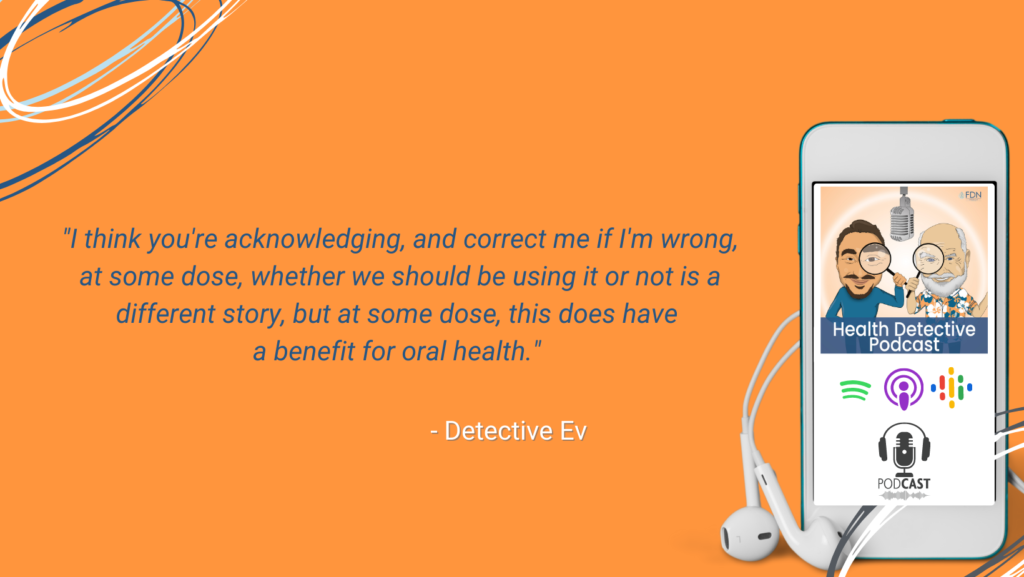
I showed Gabriela in the beginning, I have like the special water that I get from a spring. It has the testing and stuff, so that’s great and all. But you know what? Admittedly, if someone asked me, what is fluoride and what does it do? I don’t think I could give a good definition. I think you’re acknowledging, and correct me if I’m wrong, at some dose, whether we should be using it or not is a different story, but at some dose, this does have a benefit for oral health.
[00:14:15] Gabriela Couto: Yeah, absolutely. Actually, there’s natural reoccurring fluoride that’s in the water, but it’s a very, very small dose and it depends what area. Also, it depends on the type of fluoride.
Work Towards Using the Healthier Modalities
There’s so many different types. There’s like stannous fluoride, calcium fluoride, sodium fluoride. It all depends. It does strengthen our teeth. But at the same time, how long is it actually sitting in our teeth for? To me is, if there’s other modalities that you can support preventing cavities, then why not work towards that, that’s actually healthier and scientifically proven than incorporating fluoride?
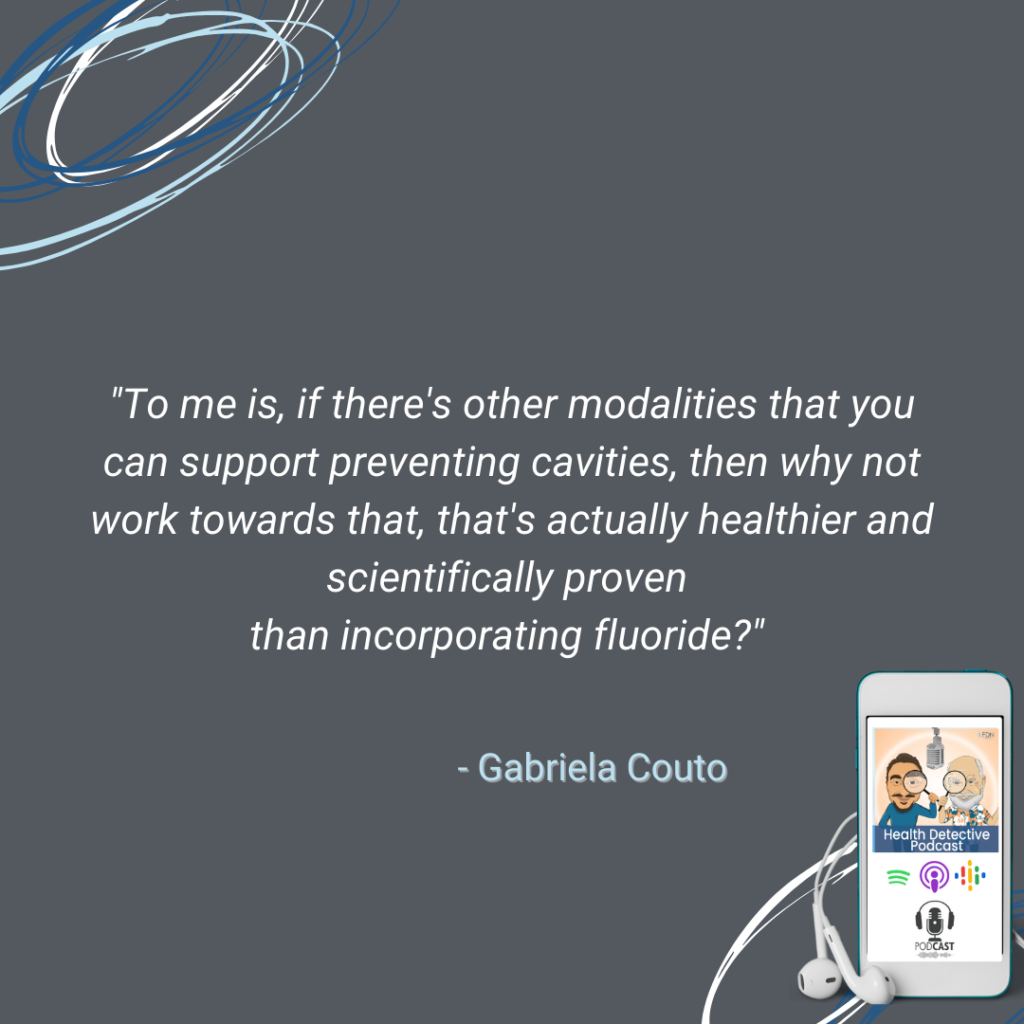
Maybe they didn’t have these studies at the time, but now, newer research is proven that like hydroxyapatite or xylitol, these are other modalities that you can support the structure and the strength of your teeth. Let’s start leaning more towards that.
It’s not even just fluoride in the water. There’s other chemicals in it that we don’t even know about. I think it’s chloride to counterbalance the acidity of it, they put chloride in it and to some extent.
[00:15:06] Detective Ev: With that said, that leads me to my next question. Again, I’m not advocating for it, but at least we’re acknowledging it’s not total quack science. There is some benefit here.
But then my question becomes, because you even said strengthening teeth, I guess that kind of already alludes to the answer, but I don’t think most people know. At least for myself, like, I don’t know, is this supposed to be an antibacterial? Is it supposed to be doing something with the minerals?
Like what does fluoride actually do that leads to strengthening teeth? Like how does this help the teeth?
High Acidity Forms Cavities
[00:15:32] Gabriela Couto: It kind of just blocks the pores. If we think of like an interwoven thing, it just makes it a little bit tighter and fills in those nooks and crannies. That’s basically what it does is it attaches to the tooth structure and supports it that way.
[00:15:45] Detective Ev: So, this has no antibacterial cleaning properties. It is strengthening the tooth.
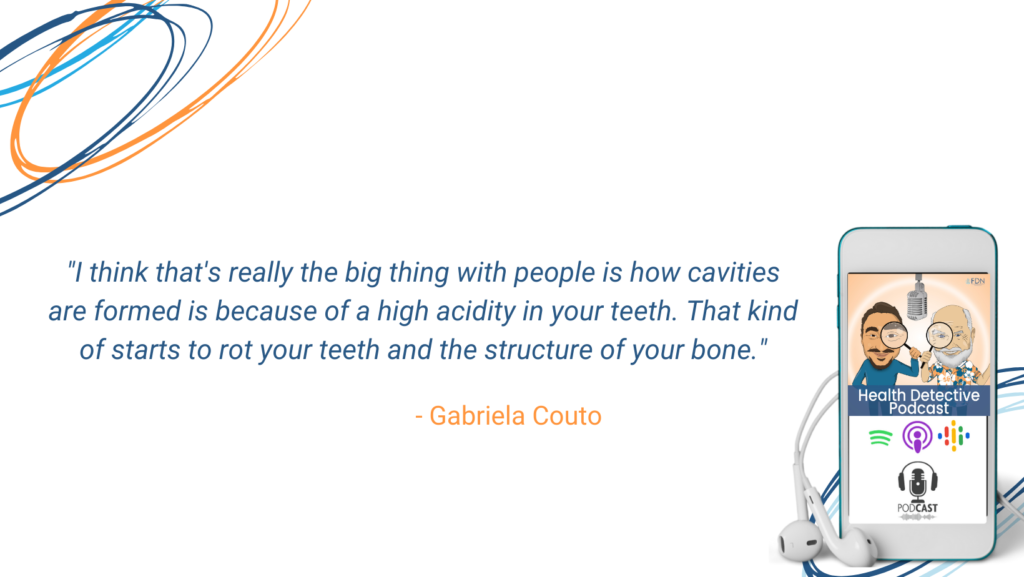
[00:15:49] Gabriela Couto: Yeah. It does reduce the acidity a little bit of the mouth, but I don’t think it’s too much. I think that’s really the big thing with people is how cavities are formed is because of a high acidity in your teeth. That kind of starts to rot your teeth and the structure of your bone.
If you have a neutral balance, that’s why you want to brush your teeth 30 minutes after you eat. Because your mouth, the environment of your saliva, is very acidic and that will kind of erode the enamel a little bit if you brush right after.
A lot of it has to do with your saliva composition as well. Like, is there calcium phosphorus in it?
[00:16:19] Detective Ev: It’s like a little scary then, that we’re like putting this into the teeth and just hoping kind of for the best. And we’re mega dosing it. Because I remember as a kid, when I went to a quote/unquote “normal dentist.” They give you those little things, they ask you to bite down and it’s like a fluoride treatment. They tell you this.
Do you think, knowing what you know now, is that dose that they’re dishing out in those things, is it too much? Or is it just like too much over time? Maybe one time would be fine, but not all the time.
Where is the Fluoride Going?
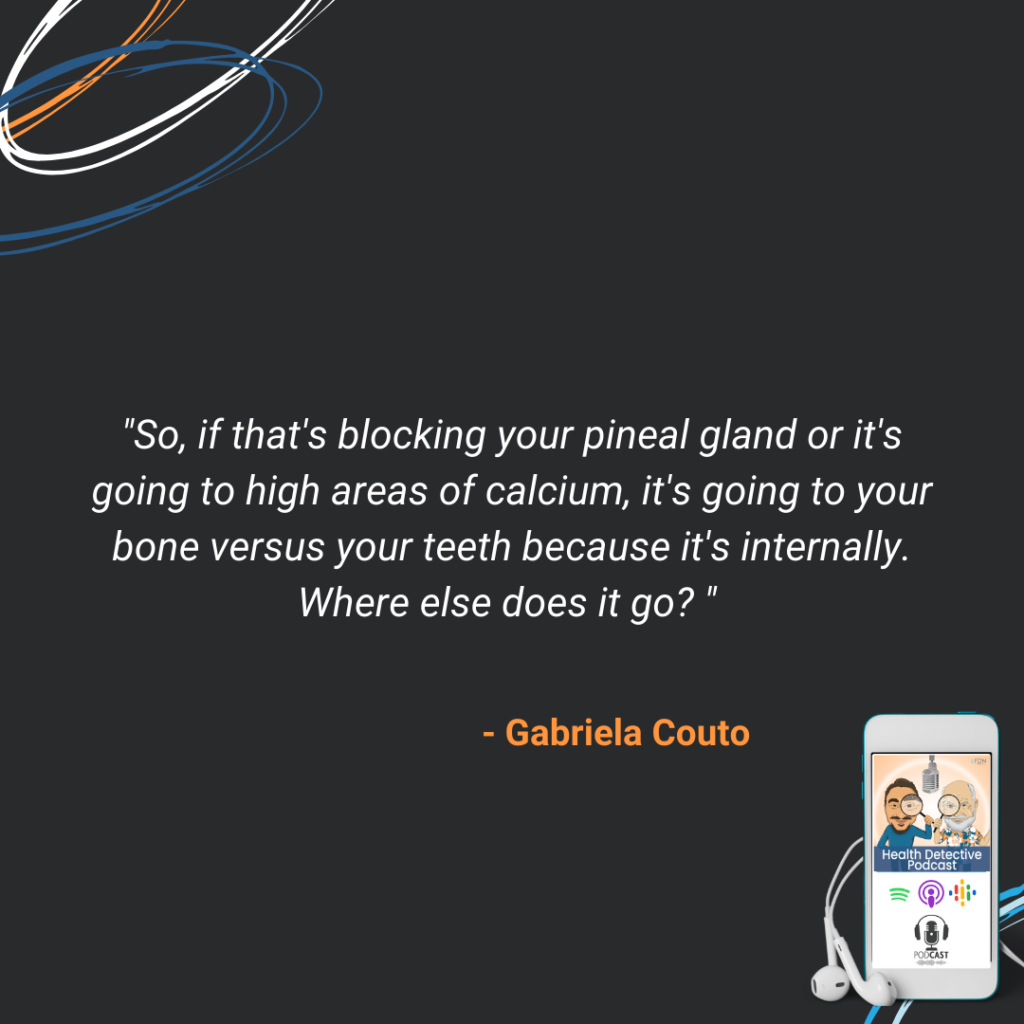
[00:16:46] Gabriela Couto: Yeah. I would say one time is fine. It’s kind of like x-rays where it’s just, it chronically builds up in you. So, fluoride, what I was studying was it goes to high areas of calcium, and it also goes to your pineal gland. So, if that’s blocking your pineal gland or it’s going to high areas of calcium, it’s going to your bone versus your teeth because it’s internally. Where else does it go? You’re not really releasing it and it’s probably blocking you in other ways, in other forms.
Going back to the osteosarcoma, that’s where it just kind of hits home to me is like, it just makes me question a little bit. Is the fluoride contributing to that? If we look at when fluoride was introduced in the water and cancer rates going up, I mean, I obviously know that it’s not just fluoride. There’s all these other toxins being involved with it as well, but it just has me questioning.
Again, if there’s other alternatives and other modalities to prevent cavities and not using that, then let’s go for that instead.
[00:17:36] Detective Ev: I’ll definitely make sure we dive into some of those. I think, myself and the audience would be very interested. You know, my family has, of all the things I’ve been able to do health wise, thankfully, I did just get this under control finally. For years that was the hardest part was like, finalizing the teeth.
What Did Europe Find?
For me, that was like the last part to truly get better. I ended up, I needed one root canal. It was kind of a terrible situation because when I got into holistic health stuff, I already had these cavities. She actually only expected the filling the last year. She said, listen, it’s so close. It’s going to need a root canal.
Now between the work she did, and I hope, other health stuff, I actually didn’t need the root canal for five years. So, it lasted a lot longer than we thought, but eventually it just kind of gave in. I just got a dental cleaning and checkup recently and they said, everything’s great. This is looking really good. I’m like, okay, we’re finally on the up and up.
But my mom, Gabriela, she’s had to have had like 5 to 10 root canals in her life. Most of these were before the age of 20 at like this sketchy dentist in the middle of Philadelphia, Kensington, Philadelphia. Not so good. We’re working through that now. I don’t want that path; I know many people don’t.
A lot of our practitioners because of their severe health issues, at one time, they did end up getting root canals. They did end up losing teeth. So, there’s a whole bunch of things that we can dive into with that.
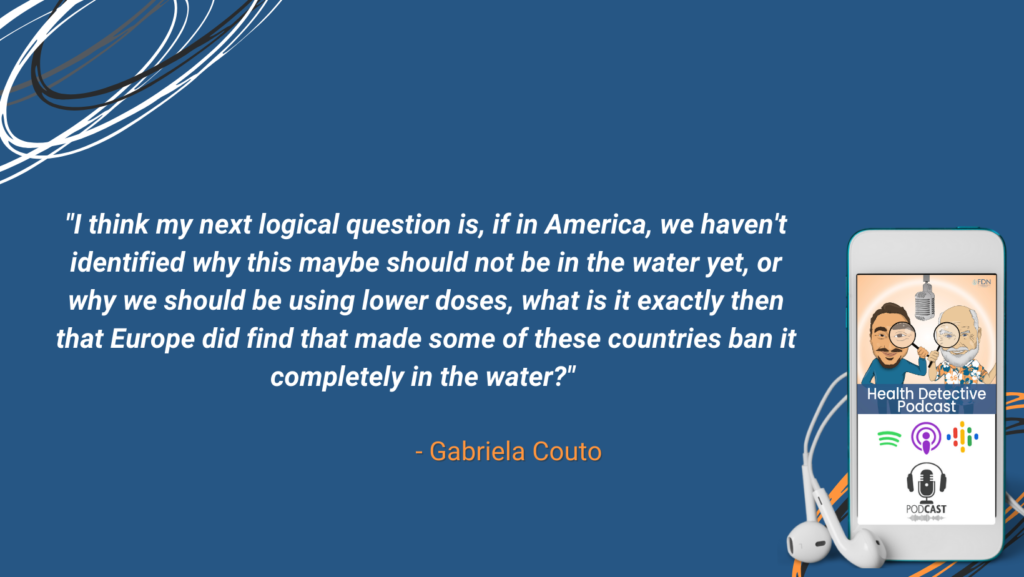
I think my next logical question is, if in America, we haven’t identified why this maybe should not be in the water yet, or why we should be using lower doses, what is it exactly then that Europe did find that made some of these countries ban it completely in the water? That’s a pretty big thing.
Studies About Different Ways Fluoride is Dangerous
So, you said 30 countries allow it in the water in the world. That means, like roughly 160 countries in the world do not allow fluoride in the water. So, why don’t they allow it in? What have they seen that made them do that?
[00:19:10] Gabriela Couto: First, I want to say, like, if there’s 190, who knows if some of them have access or even know about fluoride in the water and are they able to put fluoride in the water? It’s just also acknowledging that.
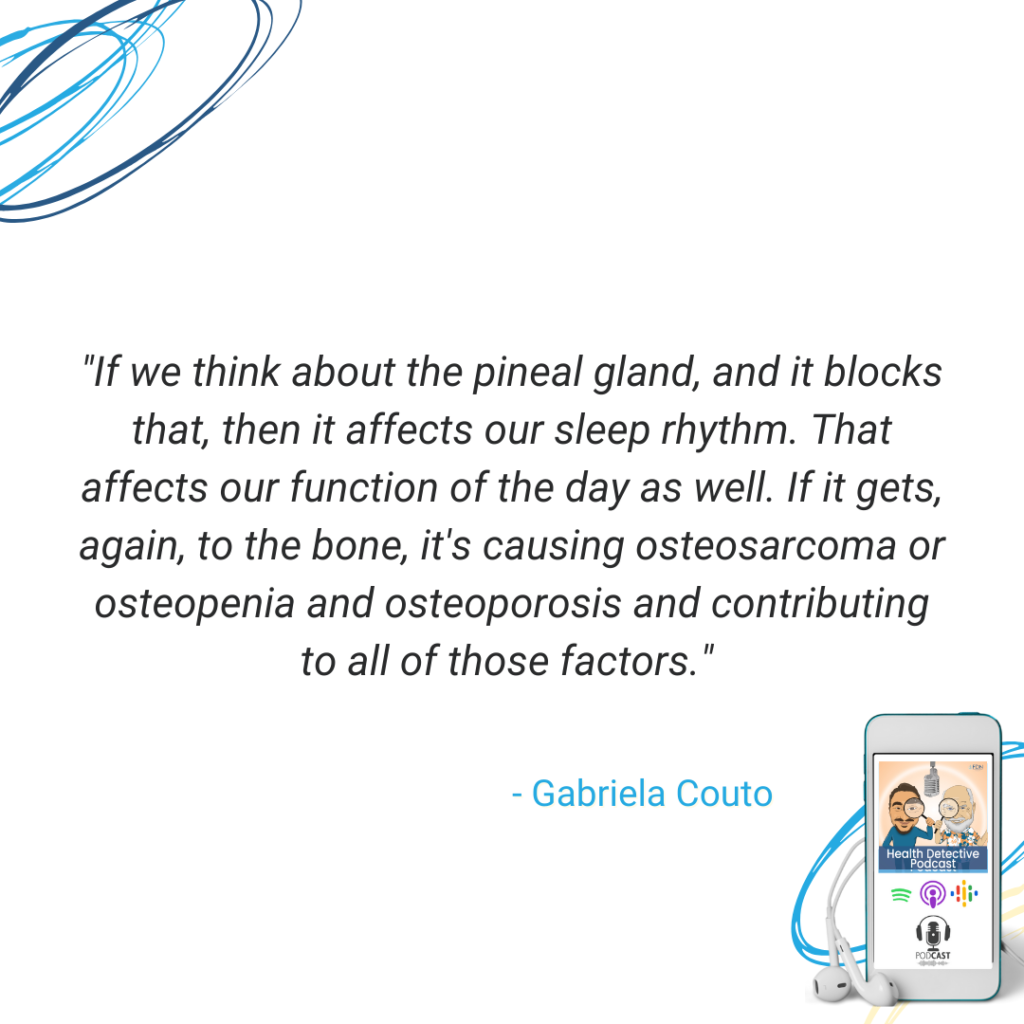
The other one is just cause it’s a neurotoxin, they do say that it is bad for our nervous system. If we think about the pineal gland, and it blocks that, then it affects our sleep rhythm. That affects our function of the day as well. If it gets, again, to the bone, it’s causing osteosarcoma or osteopenia and osteoporosis and contributing to all of those factors.
There’s also been studies that actually reduces your IQ level as well. It’s just hard to say. You know, researching, I couldn’t do enough research with other countries and why they wouldn’t allow it. Because again, when I tried using those studies for my source, they denied it.
If you look into Weston A. Price, they do talk a lot about fluoride and actually our nutrition and our diet has so much to do with it. I can also link up this girl. Her name is Rachel Yacobeez. I don’t know how to say her last name. She talks so much about how she’s actually helped remineralize her teeth through diet and having like high omega 6s and fats and dairy and stuff like that. There’s definitely ways to strengthen your teeth through diet.
Problems with the Research
[00:20:20] Detective Ev: Why do you think your sources got rejected? Like, what was their argument for that?
[00:20:26] Gabriela Couto: They didn’t want it to be outside of the country. And other studies is just like, it didn’t prove or didn’t meet their criteria. That was really the only other reason. When I try to find studies in the U.S., it’s always been the same one or that they prove it, right?
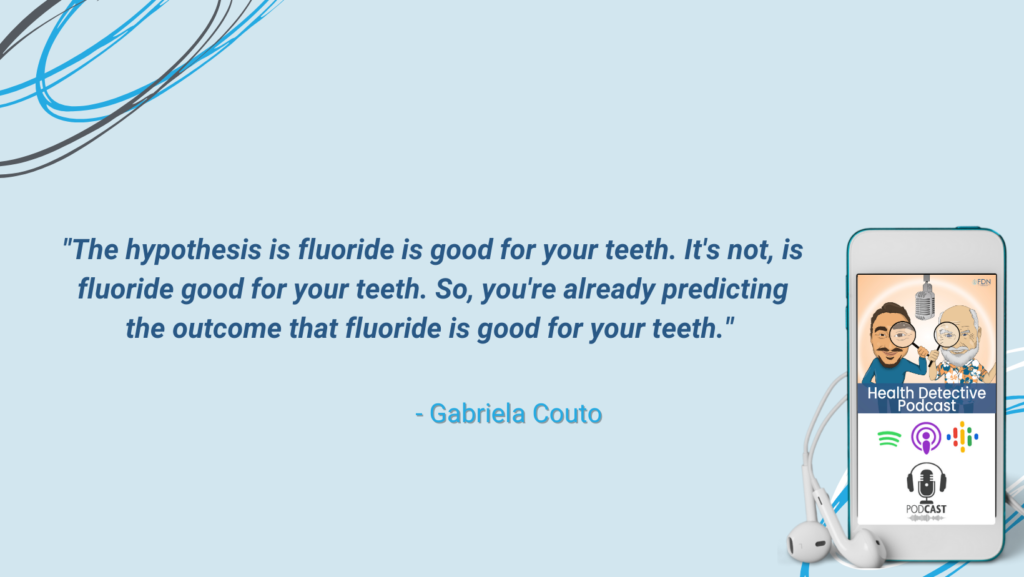
So, I actually want to talk about my perception of research. The hypothesis is fluoride is good for your teeth. It’s not, is fluoride good for your teeth. So, you’re already predicting the outcome that fluoride is good for your teeth. How the universe is going to correspond to that is it’s going to find evidence to support that versus evidence not.
It depends how you structure that question for your hypothesis. That’s why I kind of refrained from research, doing that myself, is because you had to have that hypothesis versus questioning it.
[00:21:08] Detective Ev: Okay, well, and not to challenge you. I mean, I guess that same philosophy though, could be applied to someone who’s looking for the negatives, right?
I’m sure I have been biased in that way with the things I’m into. That’s what’s really tough is you can find studies showing this diet’s great. This diet’s terrible. This diet is awesome. That diet’s terrible. It’s like, you really can kind of find what you want. I think common sense would tell us that our ancestors, cause it seems like before 10,000 years ago, there wasn’t really these dental problems.
Dental Problems Started in this Agricutural Age

It actually started in this agricultural age from what I’ve researched. I just don’t understand why we would need anything to really have proper oral health. I don’t believe for a second, that five and six-year-olds were running around with terrible toothaches and eventually having their teeth fall out and risking oral infection, which can be quite serious and lead to cardiovascular problems.
I don’t buy into the idea that human beings were designed in such a way that 8-year-olds were dying of severe infections from oral problems. That seems like a terrible flaw in our design, whether you’re taking a God perspective, evolutionary perspective, or both, it just seems like a really big flaw.
Commercial Break – Try the FDN Course for Free
Hey, you know what else is a big flaw? The fact that you’re listening to this podcast, considering the FDN course, and yet you haven’t started it for free yet. Go to fdntraining.com/tryfdn and what we have there is actually the ability for you to try the FDN course completely for free, no credit card required, nothing like that.
You’re able to just go through it, see if this is something that you actually want to pursue. Because we know that there are tons of people out there, both listening and not listening, who need this course, who actually want this course. But it’s a big investment, right? It’s worth it if it’s for you, but it’s a big investment to someone that it might not be for.
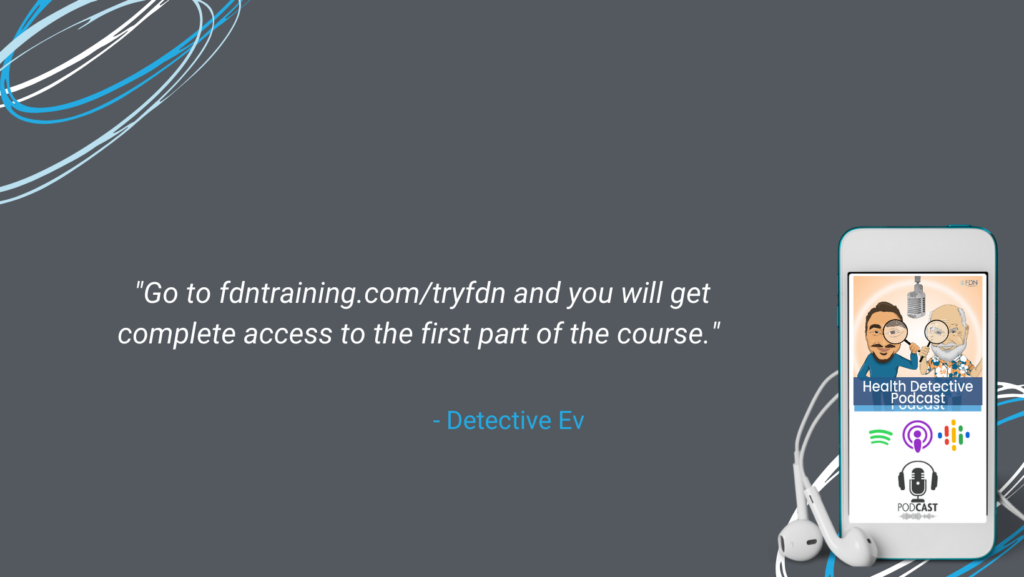
So, it’s intimidating, right? We got to figure out, is this something I actually want to go do? Well, now you can do that. Go to fdntraining.com/tryfdn and you will get complete access to the first part of the course. You will be able to make an informed decision as to whether or not it is for you.
Okay. Now back to the episode.
Fluorosis and Weak Teeth
[00:23:04] Gabriela Couto: I do agree with you. It’s a double-edged sword. You can look at it for the good and you can look at it for the bad. Again, it goes to the hypothesis is how you reframe that question. Is it good for you? Versus predicting that it is good for you.
When we talk about processed food, how that was just recently introduced, and that’s why we’re having high cavities and neglect from parents, because they’re not able to support that.

But I do want to talk about fluorosis a little bit, because it’s something that we also learned in school. There is such a thing where if you have high doses of fluorosis, it actually causes stain of your teeth, which is white or brown stains. You’ll see like little white patches. If you have too much of that, you can start to develop model teeth, especially at a young age.
One is, we’re not supposed to give fluoride to kids under the age between three to six. Around then is when you can slowly introduce it. But model teeth is actually very weak teeth. It creates an area for cavities. You’re more prone to cavities with model teeth because it’s weaker and it’s softer. If you have too much fluoride, that’s what happens to you. You have to have the right dose. And again, you can’t control that dose anymore.
Fluorosis In the Developmental Stages of Teeth
[00:24:03] Detective Ev: Wow. That’s kind of scary because I only got my teeth like professionally whitened one time. It was actually when I was about to meet Mattie. You know, you want to look good, right? So, I do this, and it worked really well. The girl that did it explained to me, she’s like, oh, just so you know, there’s some spots right there. I’m like, Okay. Why did this happen? This is expensive treatment, right? I’m trying to look good.
She’s like, well, that’s a fluoride problem. Like if you had too much fluoride as a kid, you get these types of white things. I’m like, oh, okay. I didn’t think about that really twice when I was there. I mean, Gabriel, this was like within the last two years that someone said that to me. You know, and I’m not drinking water with fluoride, in it 95% of the time.
If I travel, sometimes you can’t avoid certain things or if I’m in a school, fair enough. But most of the time, I’m not. I don’t use it in my toothpaste either. You said it can kind of build up over time. I mean, is this just stuck there once it’s there?
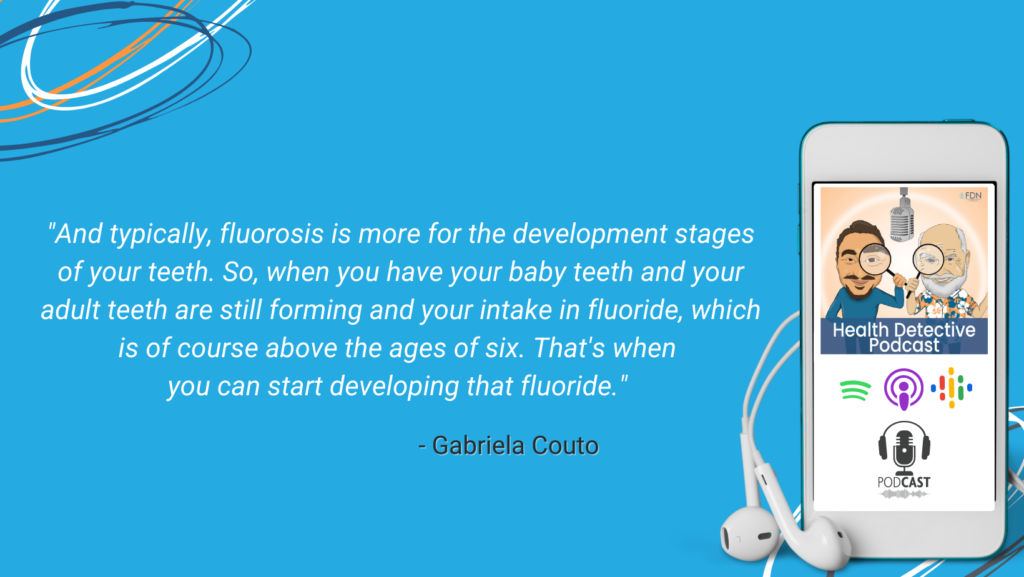
[00:24:49] Gabriela Couto: Yeah. And typically, fluorosis is more for the development stages of your teeth. So, when you have your baby teeth and your adult teeth are still forming and your intake in fluoride, which is of course above the ages of six. That’s when you can start developing that fluoride.
Fluoride is Dangerous for the Body and Brain
It’s actually kind of crazy, cause my little cousin, he was on his baby teeth, he had a cavity. They said, oh, you have a high risk for cavity. So, they actually started to prescribe him these tablets of fluoride. To me, you’re ingesting it. How do you know that that is going to the development of your tooth versus anywhere else in your body? You don’t have control of that once it’s in your system, the blood takes it where it wants to go.
[00:25:22] Detective Ev: You’re way more versed with me than this, I’m picking apart pieces here. Isn’t it also true that ingesting fluoride has not necessarily been correlated or shown to improve oral health. Right? Like the treatments have, but I thought like drinking, it does not actually show anything evidence wise.
[00:25:36] Gabriela Couto: No, there’s no evidence that it just has to be with fluoride.
[00:25:39] Detective Ev: So, we’re giving people something in the water that we think, hypothetically, helps their teeth when they probably don’t even need it for their teeth.

We do know that this now has bad effects on the body. And the IQ ones are very well documented. That was the first thing I became aware of. That was one of the first studies I saw and that’s well documented. There’s a real study showing the IQ one is significant too. I think it was like seven to 20 points in the one study I read.
[00:26:01] Gabriela Couto: I was going to say, yeah, it’s pretty high. It’s not like a small, like one or two. It’s massive.
[00:26:06] Detective Ev: I mean, 15 points is a standard deviation. If you’re talking from 115 to 130, let’s say fluoride did that for this person.
Studies on Fluoridated Water Depending on Income Level
You’re talking about someone that has at above average IQ. Can probably go do a master’s level program, maybe a doctorate, if they have the work ethic, versus gifted level IQ, moderately gifted level IQ. That’s not a small difference at all.
[00:26:24] Gabriela Couto: No, not at all. I want to go backtrack about the fluoride in the water, because they do have some studies in the sense of like, it depends on your income level.
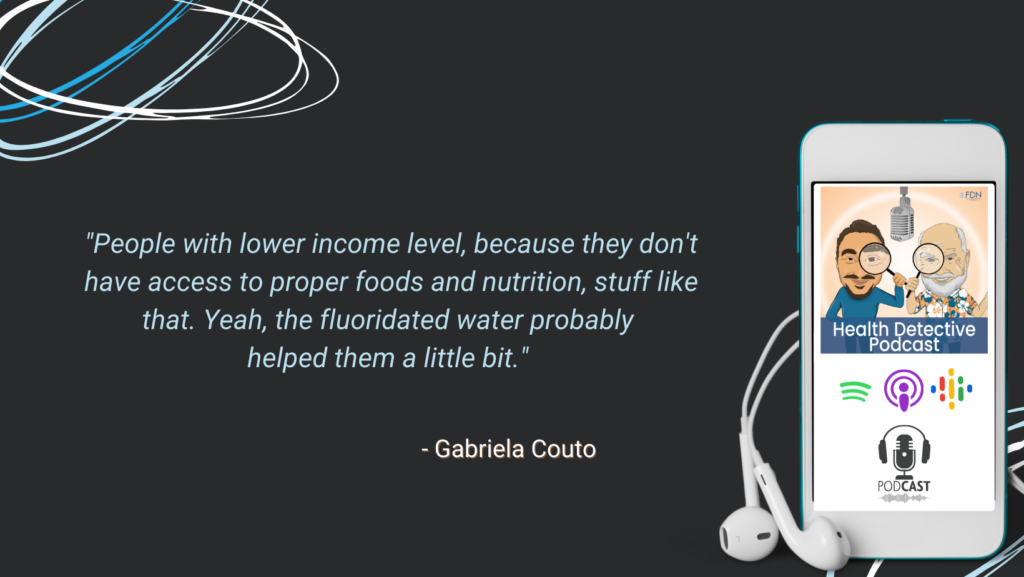
People with lower income level, because they don’t have access to proper foods and nutrition, stuff like that. Yeah, the fluoridated water probably helped them a little bit. But if there’s other people with middle class or higher class where they have access to these good diets and actually take care of their teeth, then it’s going to support them in that way.
So, fluoride, it can help you but again, there’s other modalities to do it and we can’t control where it goes to in the body.
[00:26:56] Detective Ev: Again, I’m not advocating for it either way, but I still would like to be accurate in my information. So, there are some studies at this point that do show a possible benefit to consuming this, like ingesting it and actually helping the teeth.
Gabriela Couto: Yes.
Detective Ev: Okay, cool. Well, I sit corrected then. Fair enough. Again, I’d rather be accurate than not, you know?
On the Preventative Side
I know that you were getting challenged with this and maybe it was that, but I just want to be clear about like the moment. Where comes the time where, I mean, you’re getting a free master’s degree, minus the work, which is no small fee, but you’re getting a free master’s degree, you’re doing this and you decide, hey, I’m not doing this anymore. Like, was there a final straw? What comes the point where you do that? Cause that’s a big decision for people.
[00:27:34] Gabriela Couto: Yeah. Part of it was like, I didn’t really know where I was going with wanting to get my, it was a master’s in public health. But at the same time, just them really declining every single study that I had. And when it came to the American Cancer Association, I just questioned cause we donate millions of funds every single year to support this American Cancer Society.
To do research in all this stuff, and now you’re denying it. How can we support this fund with millions and billions of dollars? Yet we can’t use their research for support. That’s when I just was sketched out about it, and I’ve heard more so controversial things versus good things.
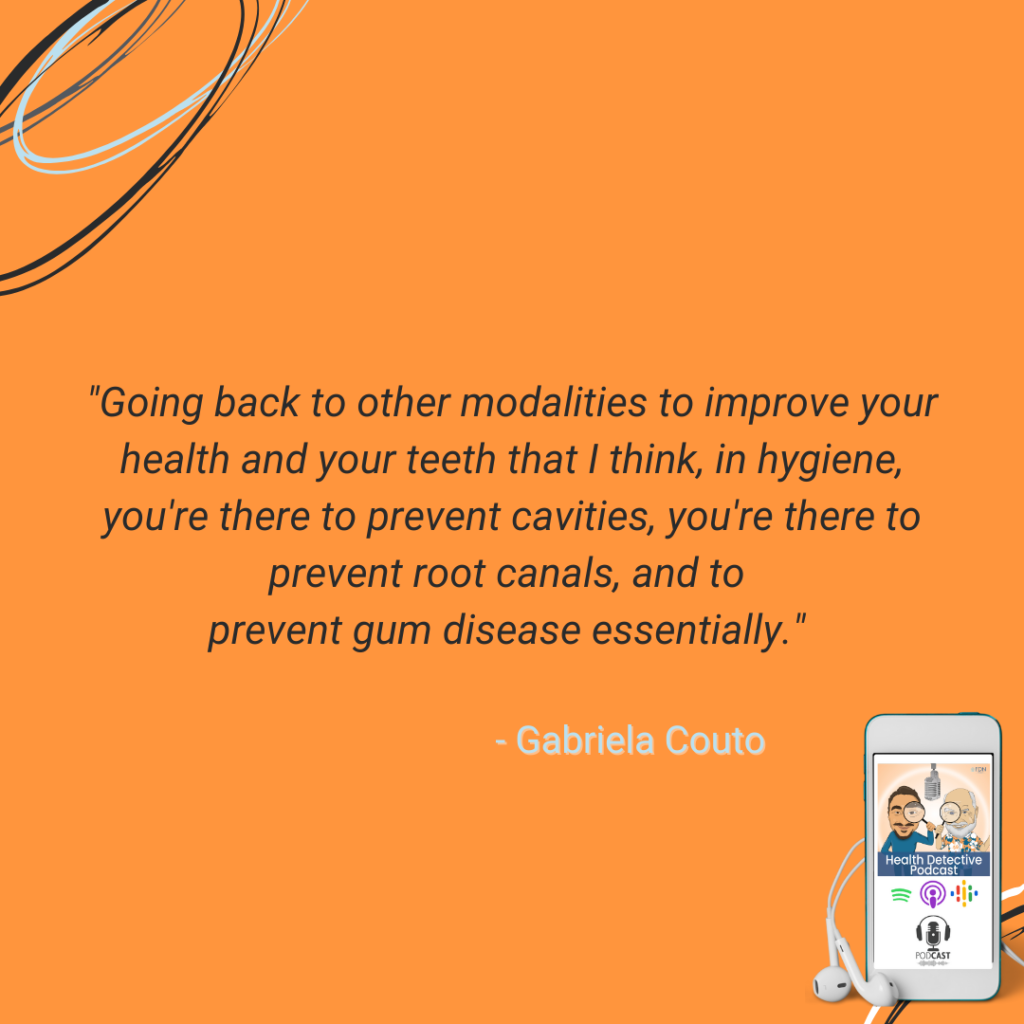
Going back to other modalities to improve your health and your teeth that I think, in hygiene, you’re there to prevent cavities, you’re there to prevent root canals, and to prevent gum disease essentially. I’m on the preventative side. If there’s other ways to prevent, that’s actually healthier for you, then I’m going to advocate that.
They Won’t Even Try to Listen
[00:28:27] Detective Ev: I’m going to transition into that just after one more thing with the fluoride piece. I guess what I’m curious about is, I think it’s easy for all of us to conceptualize the idea that at the highest level, there’s like some evil psychopath guy that’s like telling people, hide these studies or delete them so that we can give people cancer. I mean, I’m not saying that’s real necessarily. I don’t know. But at least we can kind of conceptualize that. Most people are like, oh yeah, sure.
But a person in your university or your school, that’s just trying to help out, you would think that those are well meaning people. I mean these studies; I can’t imagine that all of them are that bad. All these other countries have made decisions based off them. Did the people at the school just drink the Kool-Aid?
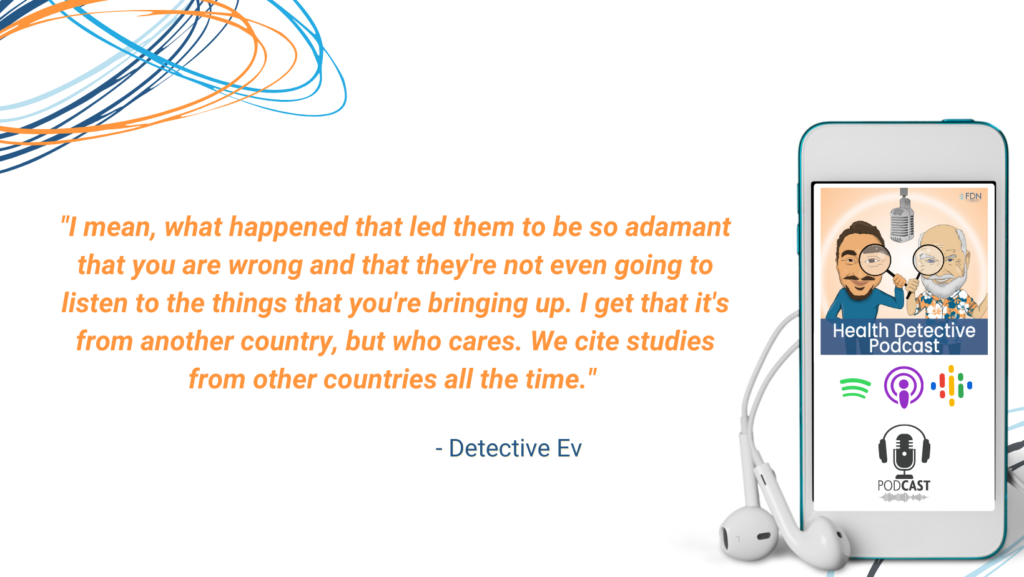
I mean, what happened that led them to be so adamant that you are wrong and that they’re not even going to listen to the things that you’re bringing up. I get that it’s from another country, but who cares. We cite studies from other countries all the time.
[00:29:15] Gabriela Couto: That honestly is a great question.
I asked them like, why are they denying it? The only thing that they said was just because it’s not studies in the U.S., that was really it. I get that we have different ways of living so how can you prove that? At the same time, we’re still human, we still generally have the same concept. Like a tooth is a tooth. My tooth structure is not different than somebody from India, you know?
Why the Very Educated May Not Listen to “Fluoride is Dangerous”
[00:29:34] Detective Ev: Well, that’s interesting. I had a doctor on one time, an OB-GYN. I asked her like, Dr. Kyrin, what can I say to the other doctors to try to get them thinking about this?
She’s like, Evan, nothing. She’s like, they’re going to need to have their own experience with this. She wasn’t condemning the doctors cause she is one herself. What she was trying to suggest is that because these people go through such rigorous education, it is so long, it’s tough. They’re told, and this is probably true, they’re some of the smartest people in society. That’s how they’re able to do this.

So, when you are this well read, you are this intelligent, and you’ve worked this hard, maybe it is tough for someone to have a 20-something-year-old person come in at the time and say, look at this, fluoride’s bad. They’re like, yeah, shut up and tell us why it’s good. It’s not right. It’s unfortunate. But at least we can understand why it’s happening, that counts for something.
But let’s switch to the positive. I mean, you have great teeth. I feel like, you know what you’re doing. What did you learn that can actually help people with this and like keep their oral health in shape without fluoride?
Natural Modalities to Take Fluoride’s Place
[00:30:30] Gabriela Couto: Well, it’s actually kind of cool because as I was doing my continuing ed courses, I did start to find some holistic sides to it. There is holistic dentists as well. You just have to find that dentist that kind of relates to you.
But so, example, xylitol. Xylitol is a natural sweetener. It has a five carbon. It actually inhibits the production of plaque, and it also helps support the teeth strength. It’s very similar to fluoride in that aspect. The only side effect to worry about is just that it can cause some problems with the intestines, like gas and stuff like that. You just have to be easy with it.
Mouth breathing. You want to make sure that your teeth are always like salivating or drinking a lot of water. So, if you’re breathing through your mouth, that actually creates an environment for acidity.
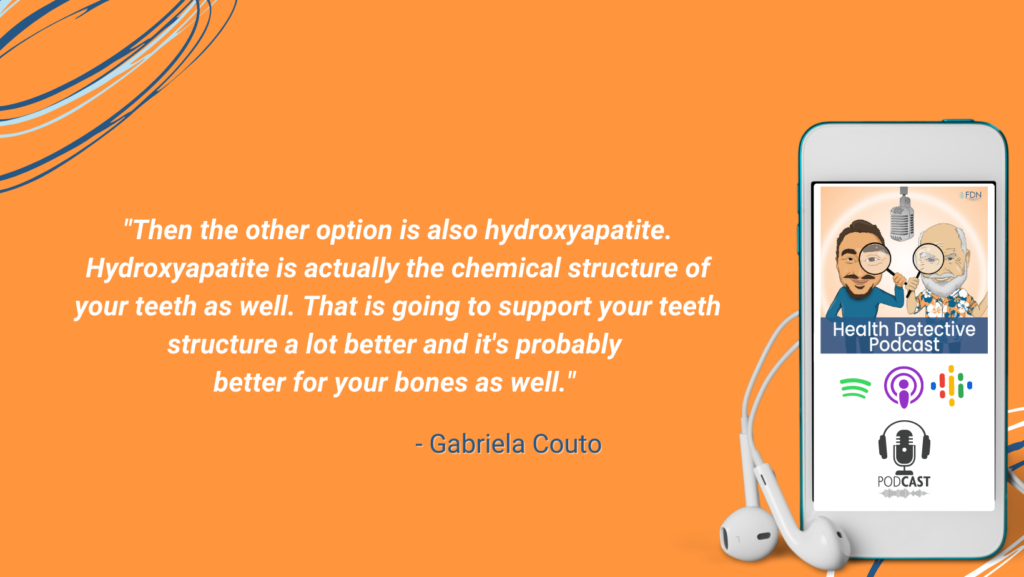
Then the other option is also hydroxyapatite. Hydroxyapatite is actually the chemical structure of your teeth as well. That is going to support your teeth structure a lot better and it’s probably better for your bones as well.
[00:31:25] Detective Ev: I have never heard that hydroxyapatite term. I’m sorry for my ignorance. Is like that a natural thing? Do I take this or like, what do I do with that?
Remineralizing Teeth
[00:31:32] Gabriela Couto: There’s certain toothpaste that has it. I can send you some. One of them is called Boca. However, I recently have learned if we’re trying to get really, really holistic is the vegetable glycerin in it. It kind of creates like a film layer over your tooth.
Our teeth has pores to it. Essentially it needs to breathe. And if we’re creating that coated layer on it, then we’re not allowing it to breathe. There’s this other toothpaste, Wellnesse. I can also send you the link for that. That doesn’t have any vegetable glycerin in it, but it does have hydroxyapatite, which is great for your teeth.
[00:32:03] Detective Ev: Cool. Thank you. Definitely send them our way because I’ll put it all in the show notes for people that are interested in kind of getting some of these products. I think that’s cool.
I’ve been going to a holistic dentist for six years. But I went to a biological dentist recently, like a true one. It was a cool experience.
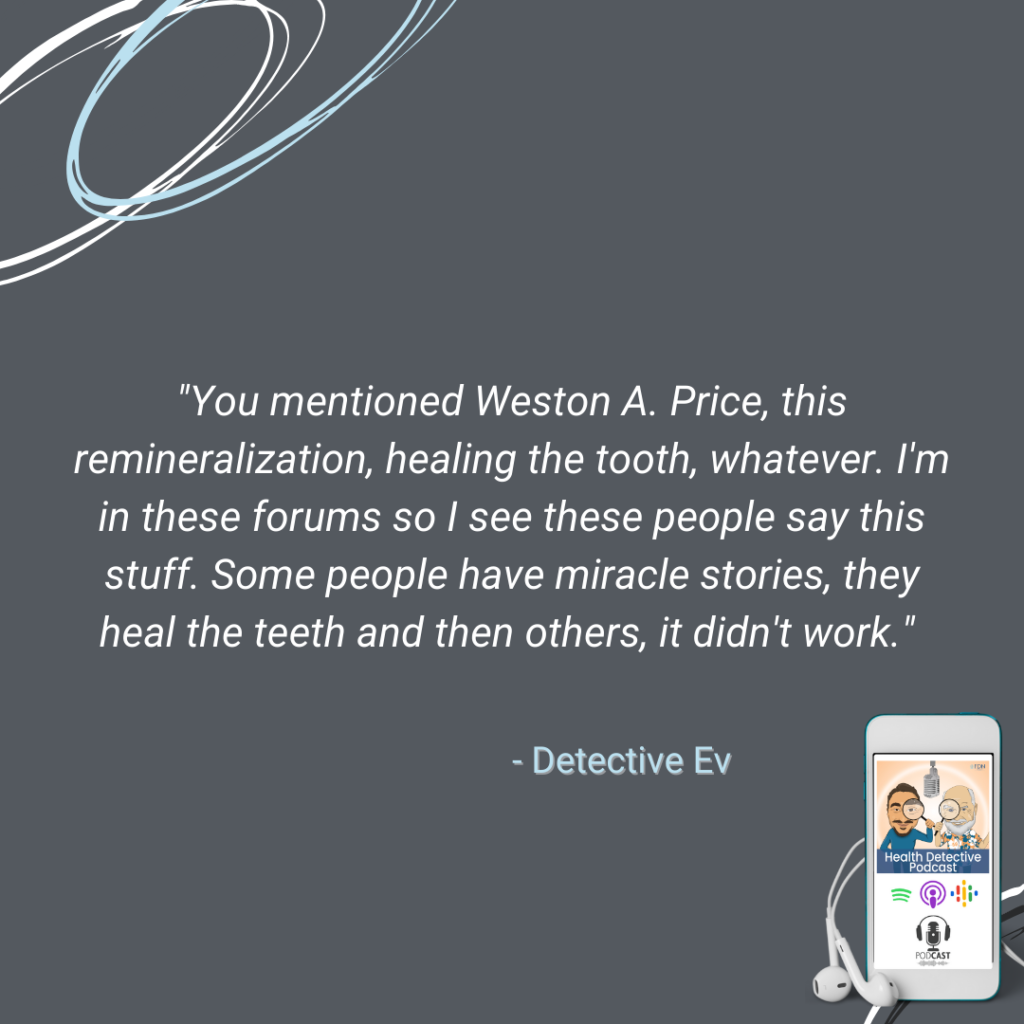
You mentioned Weston A. Price, this remineralization, healing the tooth, whatever. I’m in these forums so I see these people say this stuff. Some people have miracle stories, they heal the teeth and then others, it didn’t work. I’m like, all right, there’s got to be something here, cause they’re doing the same protocols. What am I missing?
Of course, their diet could be different, but I’m just like, they’re in a holistic forum. So, what is this? This guy explained this so well for me, he actually did this before I even said anything. This is just part of their practice and how they work. You would’ve loved working there. This place is great!
Opportunity to Reverse a Cavity
But basically, what he said is that if the cavity is only a little bit into the enamel, more or less. And forgive me if I’m messing something up here, please correct me afterwards. But he said, if it’s only into the enamel, that is when you have the opportunity, because contrary to popular belief, you actually can kind of heal and seal that enamel.
He’s like, when it goes deeper, that’s when even we here, like, we’re going to do the minimal that we have to do, but we’re going to have to drill because we can’t fix it at that point. So, I just wish they explained it like that. Like, wow. Okay. If it’s not a deep cavity, you have an opportunity. And if it’s deep enough, because of actions and lifestyle choices, then we got to do something.
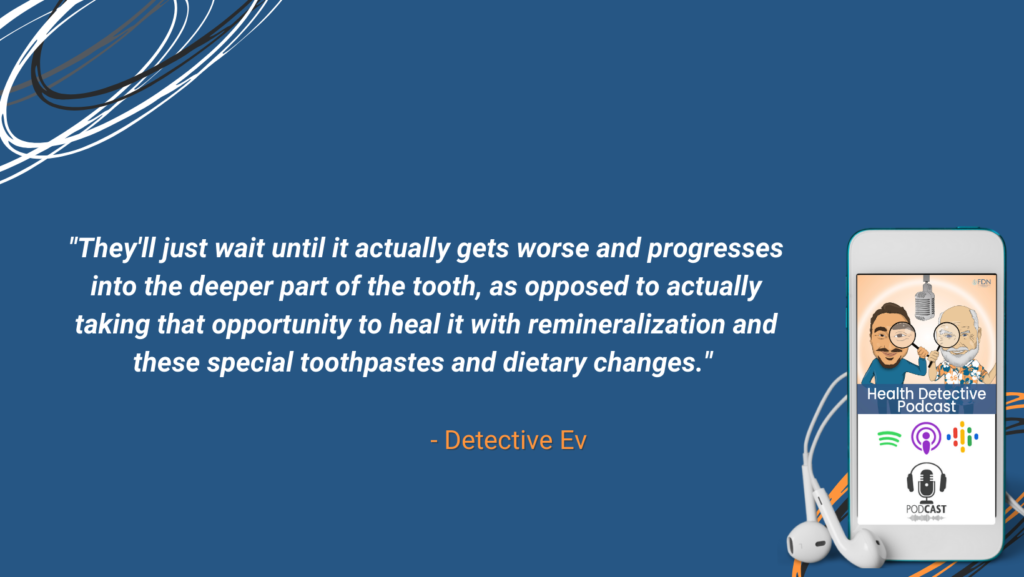
But he said, we will never drill those enamel cavities here. He said the difference between us and a lot of these other practices is the minute that they see that, there’s only one of two things. At worst, they’re going to start drilling right then. Or number two, they’ll say, well, it might get worse. They’ll just wait until it actually gets worse and progresses into the deeper part of the tooth, as opposed to actually taking that opportunity to heal it with remineralization and these special toothpastes and dietary changes.
Warning About Some Dentists
[00:33:41] Gabriela Couto: Yeah, absolutely. It’s called an incipient cavity.
We have the layer of your enamel. If it’s halfway through your enamel, then that’s easily reversible. Once it starts getting like three quarters past your enamel, it’s starting to get into another layer of your tooth, the dentin, and that is a lot softer. So, the cavity forms quicker. That’s why they say to prevent it.
Cause once it gets to the dentin, halfway through the dentin, that is super close to the pulp, which is also your nerve and where it gets the blood flow. Then that’s when you would need the root canal. That’s why we try to prevent that. Cavities are definitely reversible.
I would like to share this on this because I want them to be aware of dentists. Because I had many cavities in my teeth growing up. I come down to Florida and my dentist who takes x-rays, he wasn’t holistic or anything like that, but he’s like your fillings are so shallow, you didn’t even need half of them.
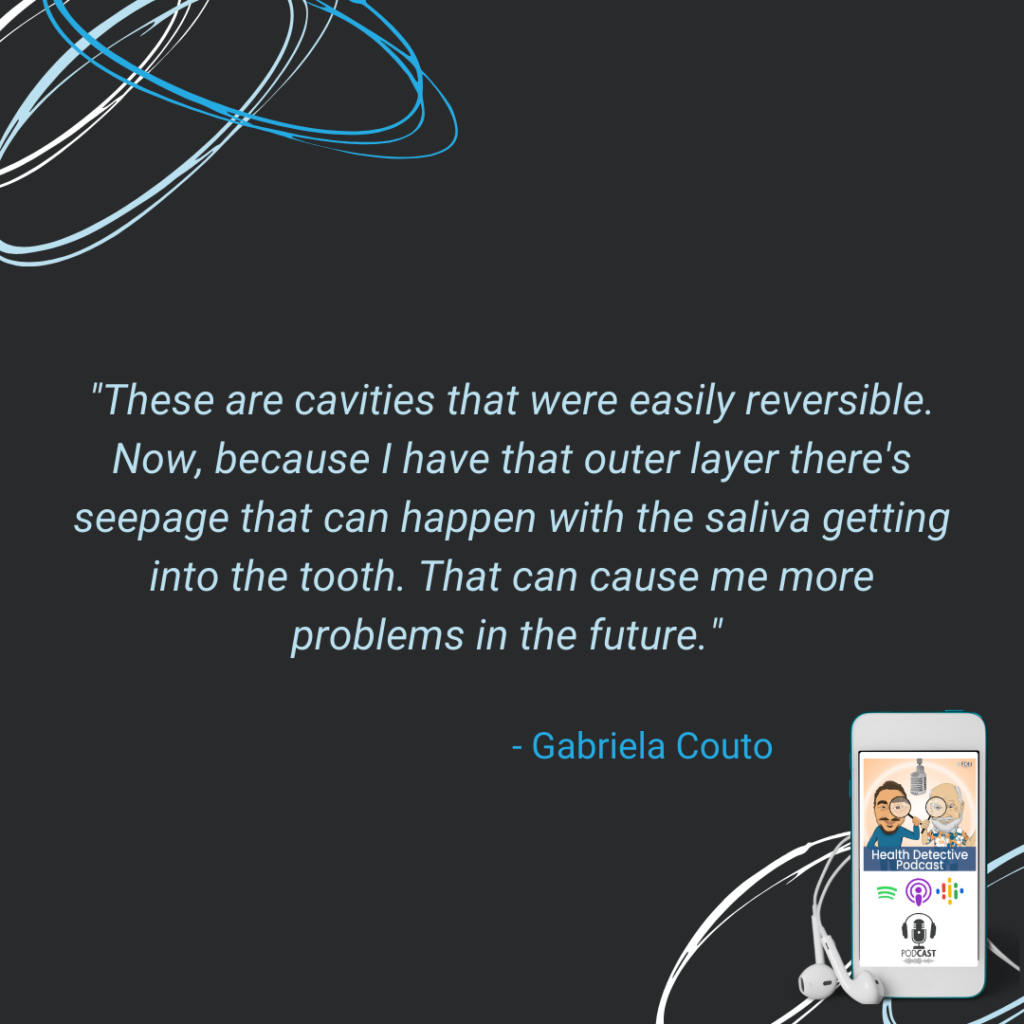
These are cavities that were easily reversible. Now, because I have that outer layer there’s seepage that can happen with the saliva getting into the tooth. That can cause me more problems in the future. I do need to be aware about that, but just making sure that you trust your dentist. Really question yourself and have them show you those x-rays to see, like, where is this cavity located.
[00:34:48] Detective Ev: Yeah. Correct me if I’m wrong, but I felt like I heard my whole life that like, once the enamel’s gone, it can’t regrow and it seems like that’s not scientifically backed at all.
Excreting Toxins from Our Teeth?
[00:34:58] Gabriela Couto: I haven’t done too much research into that aspect itself in school. They say like, once it’s gone, it’s gone. I believe to an extent you can, but it’s kind of like a cut, right? If you scar yourself, I forget the name of it, like a healing process where it’s not the perfect form of your skin, but it’s close enough that it heals itself quickly. I think you could easily do that with your teeth.
And I remember vaguely watching a video, this holistic dentist basically saying, our teeth have pores, and we have the pulp. So, it’s kind of like our bodies. If we can release toxins from our skin and sweat it out, then what makes us think that we can’t sweat from our teeth.
It’s kind of questioning, does it come from the pulp, or does it come from eating and having food sit on our teeth and not brushing it? Because if you think about it, the digestion system, like, we’re eating it. You do need to floss to get that out in between your teeth, but how much is that correlating?
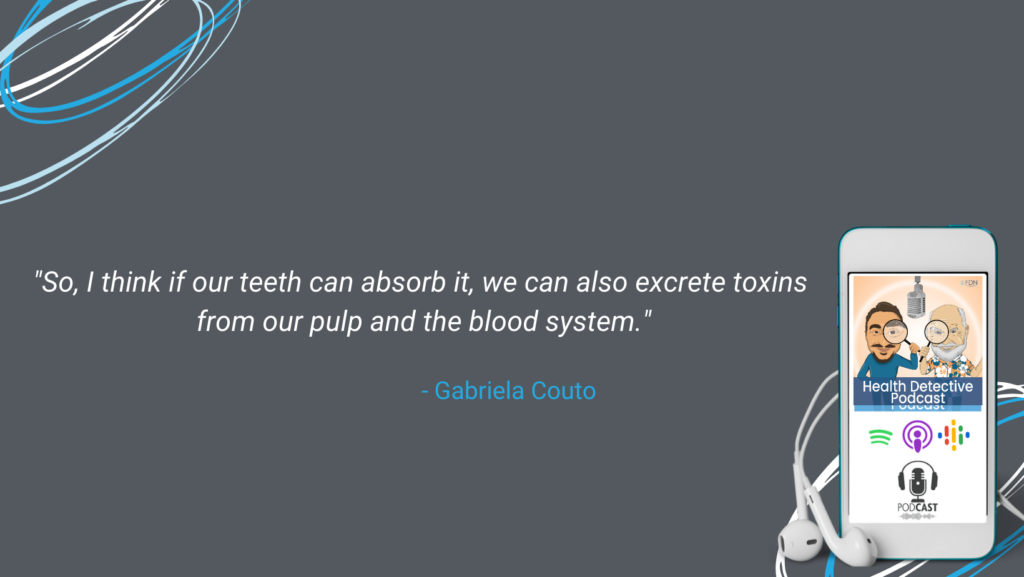
So, I think if our teeth can absorb it, we can also excrete toxins from our pulp and the blood system.
Chewing Xylitol Gum Right After Eating
[00:35:53] Detective Ev: That was another thing too, cause I was just thinking about like eating and stuff. I started to do this just, it was almost like intuitively. I knew this had to be a wise thing to do. I didn’t understand why per se, but the dentist recently just explained it. Every time, like I eat anything with carbohydrates, so not just like sugars, but even like a sweet potato. If I’m eating this, I make sure that I brush my teeth as soon as possible afterwards, to try to like, not let that sit.
Then it’s funny that you bring up the xylitol thing because I chew gum and people are like, I feel like you’re so holistic. Why do you chew gum? I’m like, well, it’s not aspartame-ridden gum, or sucralose-ridden gum. Like I’m specifically chewing this right after I eat. You know me, I travel a lot. Like I can’t always just be whipping out a toothbrush and start brushing, you know? But what I can do is start chewing on that gum with the xylitol in it.
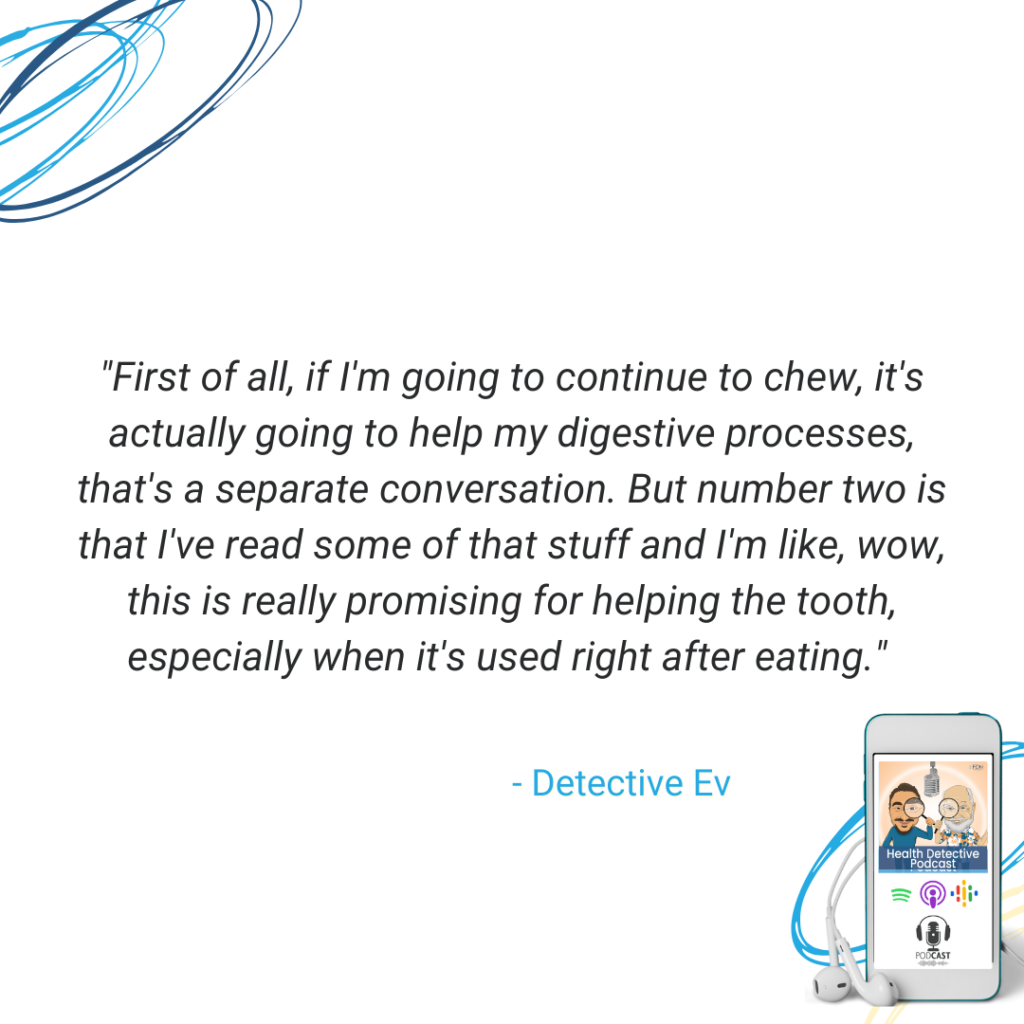
First of all, if I’m going to continue to chew, it’s actually going to help my digestive processes, that’s a separate conversation. But number two is that I’ve read some of that stuff and I’m like, wow, this is really promising for helping the tooth, especially when it’s used right after eating. So, there’s a lot of little things that people can do.
They can do stuff like that. You mentioned a special toothpaste. Is there anything that you know, people don’t necessarily normally talk about that you think is cool? Like I know oil pulling’s a hot thing. Like, I’m curious if you have any cool tips and tricks.
Oil Pulling Takes Out Bacteria
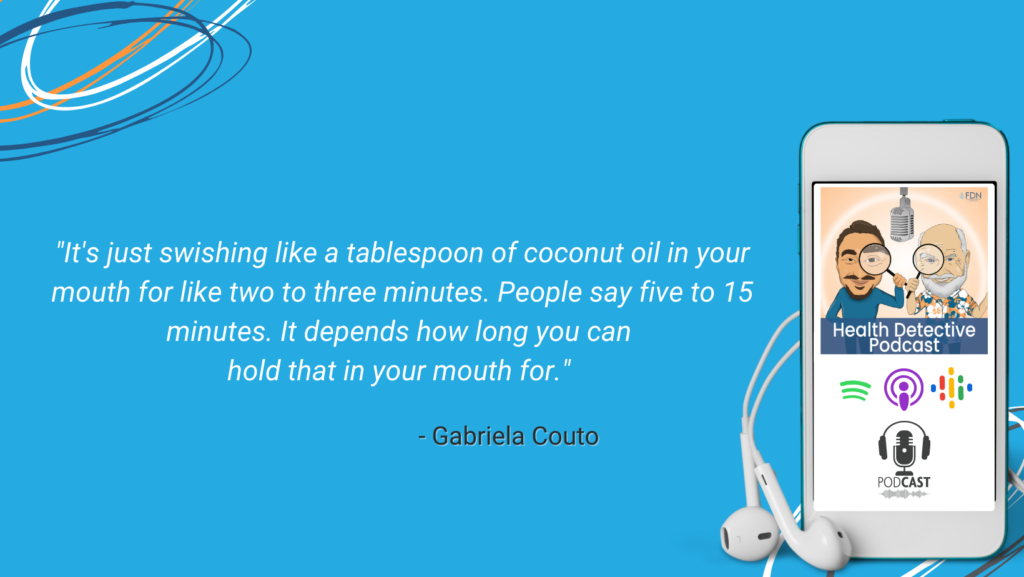
[00:37:02] Gabriela Couto: Definitely oil pulling is a cool modality that you can use. It’s just swishing like a tablespoon of coconut oil in your mouth for like two to three minutes. People say five to 15 minutes. It depends how long you can hold that in your mouth for. But it actually takes out all those bacteria.
People tend to use hydrogen peroxide as well. Which you can, however, you really have to dilute that, and you have to be very careful with it because that also strips out the good bacteria as well. I would say to rinse your mouth with water right after you eat before you brush right away. Again, going back to the acidic environment, you’re actually causing more erosion of your enamel because it’s stripping that out.
Other than that, a little fun fact actually is, I remember learning in school that you’re actually not born with a bacteria that gives you cavities, it’s transferable. So, like, if you share a water bottle with somebody or you share a drink or a straw or the same fork, or you kiss somebody, that’s typically how, especially if it’s activated.
So, if you have an active cavity in your mouth right now, and you’re going to kiss somebody or you share something, then you’re transferring that bacteria to them. So, got to be careful with that!
[00:38:05] Detective Ev: Think twice before you start kissing a bunch of people in high school and college, kids, right? Watch out. Might end up with some bad bacteria in your mouth.
Get the Facts Before Sharing the Info
So that’s cool. I know that you ended up taking a different career path and I’d actually love to talk about some of that stuff today. I think it’s relevant to our audience overall. But just to make sure we cover everything with this, I think this is a great overview. I think there was a lot of science-backed to this. It’s an actual person that’s researched this, not just someone that went on YouTube and heard fluoride was bad and then shares it with other people.
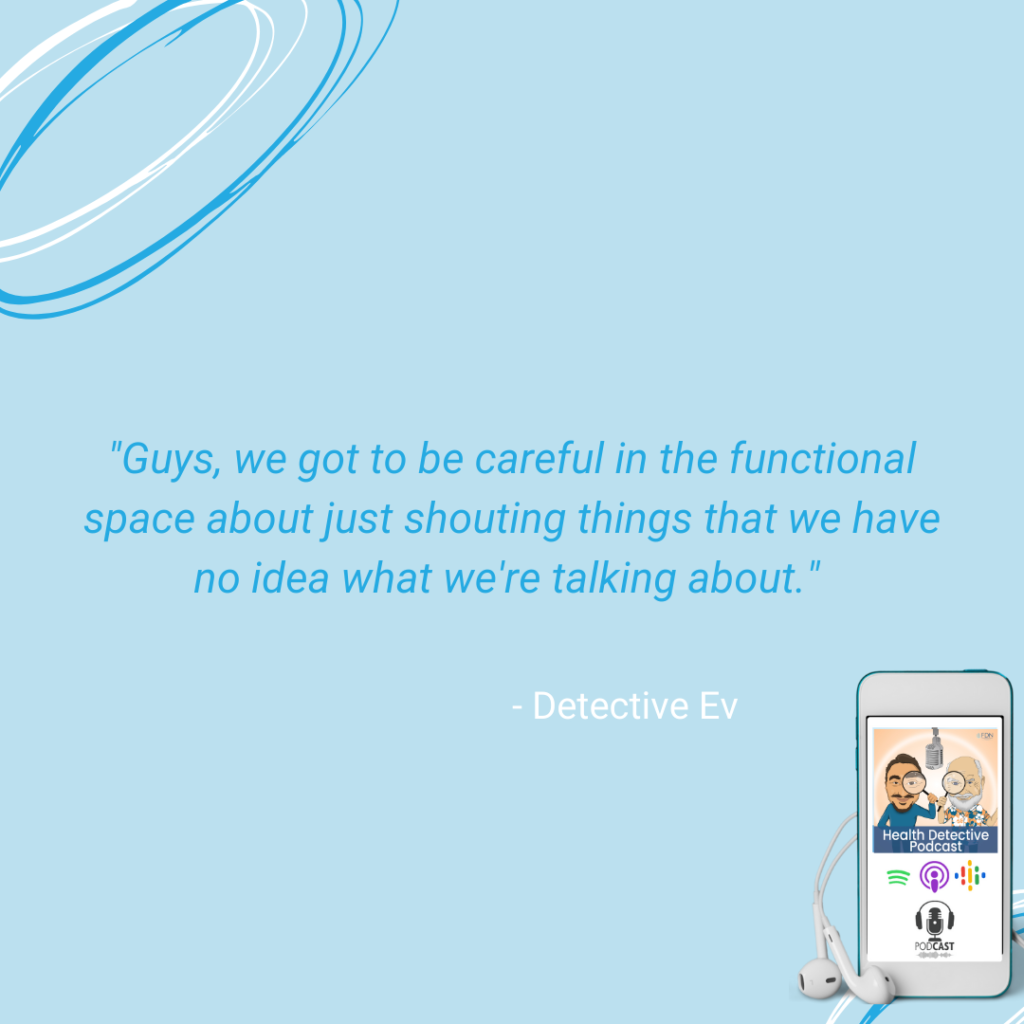
I’m not saying there’s necessarily anything wrong with that to spark the idea. Guys, we got to be careful in the functional space about just shouting things that we have no idea what we’re talking about. We heard someone else say it, so then we repeated it. It’s like we got to get the facts or at the very least admit that.
Like for myself, I don’t drink fluoride, but I can’t sit here and rattle off everything that you just did. It’s a personal choice. I’ve never really told anyone else to do it per se. I just kind of allude to it. Then that’s when they usually bring up, well, there’s no fluoride in my Dasani water anyway, it doesn’t say it on the back. And I’m like, oh…
[00:38:59] Gabriela Couto: Wait, speaking of Dasani, Dasani is one of the worst waters that you can drink. It has a very, very low pH system. So, actually, creates that acidic environment in your mouth. It’s kind of like tap water. I’ve had like multiple different sources with that.
Former President of Colgate Removed Himself as President
Also, a little fun fact, just cause this came up, when I was in hygiene and doing that research, I contacted this former president of Colgate. The reason why is because I was starting my hygiene Instagram and he was creating this these little tablets called Bits. I don’t know exactly what happened with that, but his motto was he wanted people to brush their teeth who didn’t have access to water in like those third world countries.
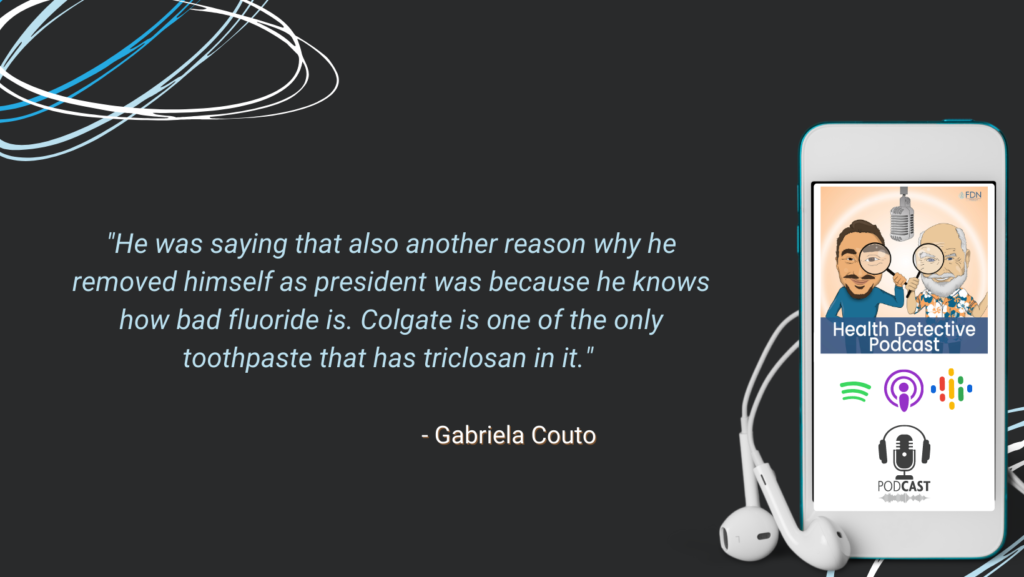
He was saying that also another reason why he removed himself as president was because he knows how bad fluoride is. Colgate is one of the only toothpaste that has triclosan in it. Those two chemicals are probably the most neurotoxins, more harmful chemicals that we can ingest.
[00:39:52] Detective Ev: Wow! Former president of Colgate. I just found my excerpt for the advertisement for this podcast. Thank you. That’s good stuff right there. I’ll write that down.
This is important, you know, and I actually appreciate his integrity in a sense, because, I mean, I’ve never looked at the numbers. I would imagine the president of Colgate’s going to, guess that’s a six, seven figure job, you know.
It can be really tough for a lot of us, I think. I think most people have a price. You know, I want to believe I don’t. I genuinely believe that, but you know, you see people that seem pretty great, and they do get bought out. So, good for him for coming out and saying that.
There was actually one other thing that I wanted to make sure we touched on with the teeth stuff. You had mentioned something, I believe, I researched this, and this is very scary. It’s very real and it’s very interesting.
Nazi Scientists – Operation Paperclip
Something about the German scientists having come over and doing something with the fluoride. I know that we can get pretty wacky with this probably pretty quick, let’s focus on the factual evidence of what happened. What went down with these German scientists coming over with the fluoride thing?
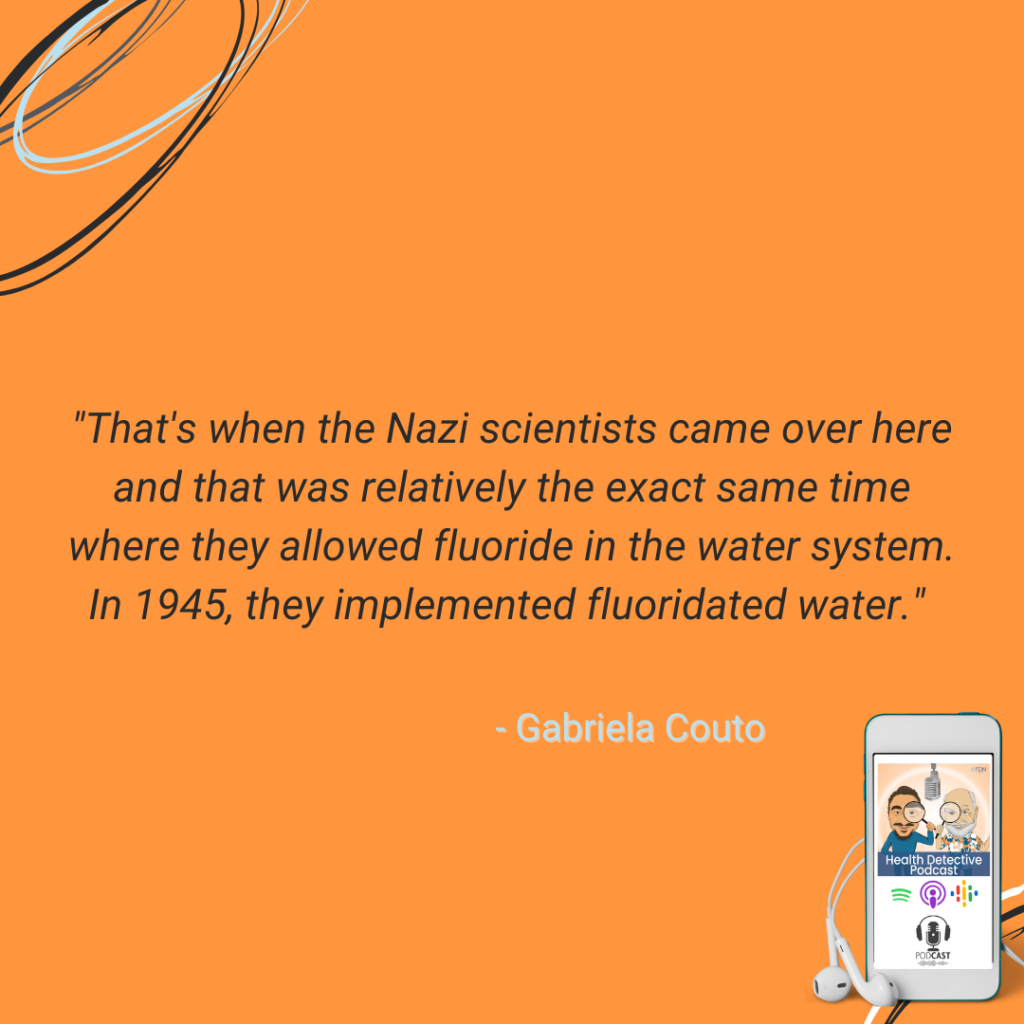
[00:40:50] Gabriela Couto: They actually used fluoride as a gas, so fluorine, in the concentration camps to kill people. I feel so harsh saying that. There’s no other easy way to say that. But they did come over here. If you look into, it’s called Operation Paperclip. That’s when the Nazi scientists came over here and that was relatively the exact same time where they allowed fluoride in the water system. In 1945, they implemented fluoridated water.
To me, I just question that. I did study a little bit more about that. It was this company, I’d have to look that up, but it was a company, and they were spilling fluoride in the water system. He wanted to cover himself up, so he hired a scientist. I was trying to do studies to see if that scientist was somebody from the Nazis or whatnot, but basically to prove that fluoride was good for you. I can definitely do a little bit more research on that. Not to say or accusing that that is what happened, but I, again, I just question it and I associate some things together.
[00:41:46] Detective Ev: No problem. You know me, when I’m with a friend, I like to get into my wacky ideas and cool stuff, that’s fun to humor. But at the end of the day, if I’m going to say something publicly, or if I’m actually going to die on a hill, I’m going to stick to the facts.
These Things Leave People Wandering
And what’s really interesting is this world’s pretty crazy. Just look at the factual things that have happened throughout history. People ask why I don’t read like fantasy books. I read like a lot of nonfiction and my friends always try to get me to read fantasy. I have not found any fantasy book that’s more interesting than the craziness of this world yet.
I’m not condemning them. I’m just saying for me, the stuff that I read that has happened in government and the world, that’s crazy enough and way far out of my comprehension. I don’t need to be reading any fantasy books quite yet. So, I encourage people to look up that Operation Paperclip thing.
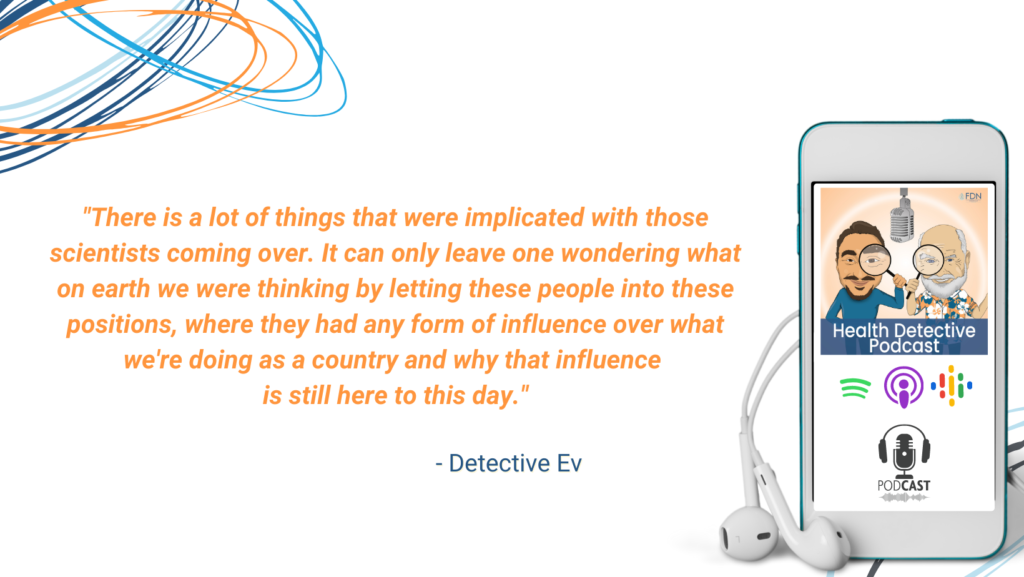
There is a lot of things that were implicated with those scientists coming over. It can only leave one wondering what on earth we were thinking by letting these people into these positions, where they had any form of influence over what we’re doing as a country and why that influence is still here to this day. Before I get censored here, I’ll stop talking.
All right, Gabriel. What do you do now? Because we had someone on before, and if you’re a longer time listener, you might remember her. She was around episode a hundred maybe, her name’s Skye Gallagher. She talked about trauma; she did a great job. People actually really loved that episode. Gabriela and Skye actually worked together. Could you just talk about what you’re doing now? Cause I think it’s going to be relevant to a lot of our practitioners that are starting businesses or are already in business for themselves.
Working Together to Help Entrepreneurs
[00:43:09] Gabriela Couto: Skye, she’s one of my favorite persons. She’s absolutely amazing and she’s so knowledgeable. She does marketing and business coaching. What she’s realized with her clients in the past years was that they were really struggling with their mindset and just kind of their way of life. It wasn’t just business that was holding them back. It was other areas of life as like relationships, and family, or personal health. Just blockages from their limited beliefs and trauma growing up, that they never were able to resolve. It was blocking them from reaching their potential.

So, when I got my NLP certification, I wanted to do it on Skye, cause she’s a good friend of mine. She really got a lot of value out of our work together. She was like, this is exactly what I need to hire for, to expand our coaching. Now we’re working together helping other business and entrepreneurs, especially related to health, overcome any of those limited beliefs so that they can really tap into their highest potential.
[00:44:05] Detective Ev: I have no problem saying it, I actually worked with Gabriela and Skye personally. This was something, just so you guys know, I paid them for. And you were generous. It was a friend’s thing. But it’s not like it’s no fee, you know what I mean. I paid something. And they did a great job.
I’m still actually working with Skye on certain things. I have calls still, which is great. But it’s a really interesting combination that I don’t know that every entrepreneur would be open to it, but like our people here. This is a dream come true what you guys mix together. You usually can’t find a place where both things are respected.
Where to Find Gabriela Couto
You know, you either get these highly technical, marketing numbers people, which is a very useful skill. Or you get these people that are thinking a little more outside the box, subconscious mind, limiting beliefs and that’s very important, and legitimate too. So, to combine them both, pretty smart and I’m glad you guys are doing that.
Where can they find you? And then where can they find the coaching if people are interested in that?
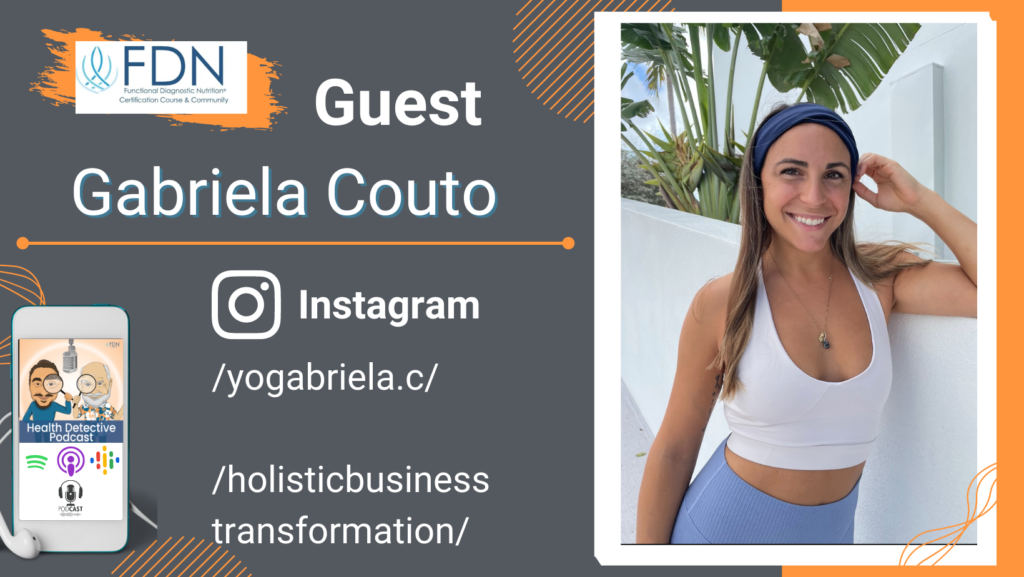
[00:44:53] Gabriela Couto: Yeah, you can find me on Instagram at yogabriela.c. And Skye, well skyegallagher. Then we are starting our own Instagram at holisticbusinesstransformation. That is also our other business account where you can apply for the coaching.
[00:45:07] Detective Ev: Sweet. All right, Gabriela today flew by. I have one more question for you. It’s the signature question that we ask everyone on the Health Detective Podcast to finish up. It’s cool because you have a lot of different areas of study. Just because we talked about teeth today doesn’t mean I’m going to know how you’re going to answer this.
Health Detective Podcast Signature Question
My question for you is, if I could give in this case, Gabriela a wand, and you could wave it and get every single person in this world to do one thing for their health, whether that’s get them to do one thing or get them to stop doing one thing, what’s the one thing you’d get them to do?
[00:45:34] Gabriela Couto: I could go on so many different aspects of this. If we’re talking about mental health, I would definitely say to start with awareness and realizing how are you speaking to yourself, the language of your mind, and how your mind is speaking to you. I love the whole mind-body connection.
So, I just say, movement, getting your body out to move, seeing what your body says to you. I don’t mean just by like, yes, walking is great, but like, what are like the tightness of your hips? If you are working out a lot, just making sure that you’re being counter active with the stretching aspect of it, because we do tend to hold a lot of trauma in our fascia.
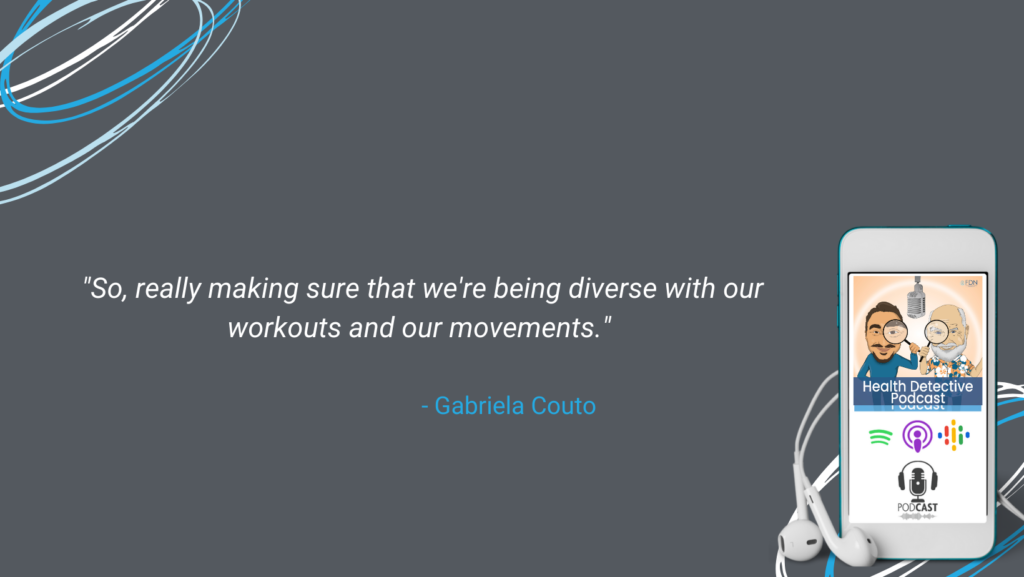
So, really making sure that we’re being diverse with our workouts and our movements.
Conclusion
[00:46:13] Detective Ev: Okay guys, that’ll do it for today’s episode with Gabriela Couto. Gabriela, thank you so much for coming on. Once again, we appreciate it, especially because I recruited you. It’s not like you’re out here trying to advertise a business or sell a product.
There’s nothing inherently wrong with any of those things, but it is particularly cool to me when someone is willing to come on just for the sake of helping people, especially when podcasting might be out of their comfort zone, because it’s not something that they do often. We need more people like that. We need to be people like that.
If you’re enjoying the information that we’re sharing on this show in general, I can’t tell you how much we would appreciate a five-star review on Apple and or Spotify. If you did that, we would love you even more than we already do.
I will be back next time with yet another interview. But until then, please take care.

You can always visit us at functionaldiagnosticnutrition.com. Try the FDN course for free at fdntraining.com/tryfdn. To hire one of our coaches, go to fdnthrive.com. And for a free Health Review, go to fdnthrive.com/match.

